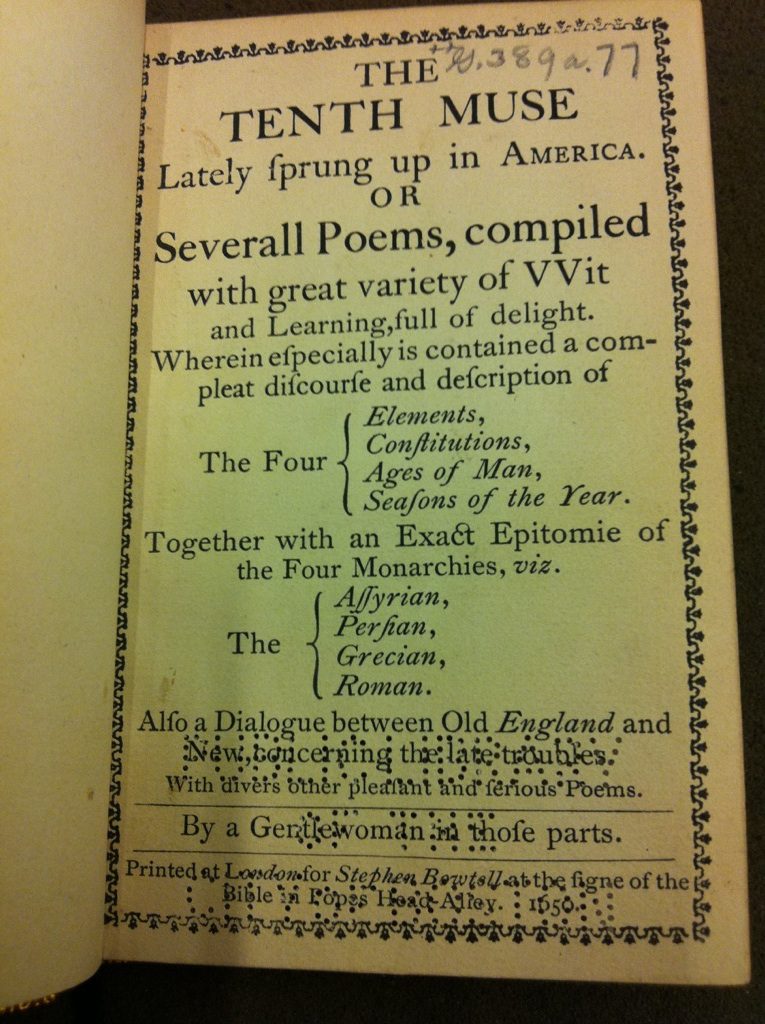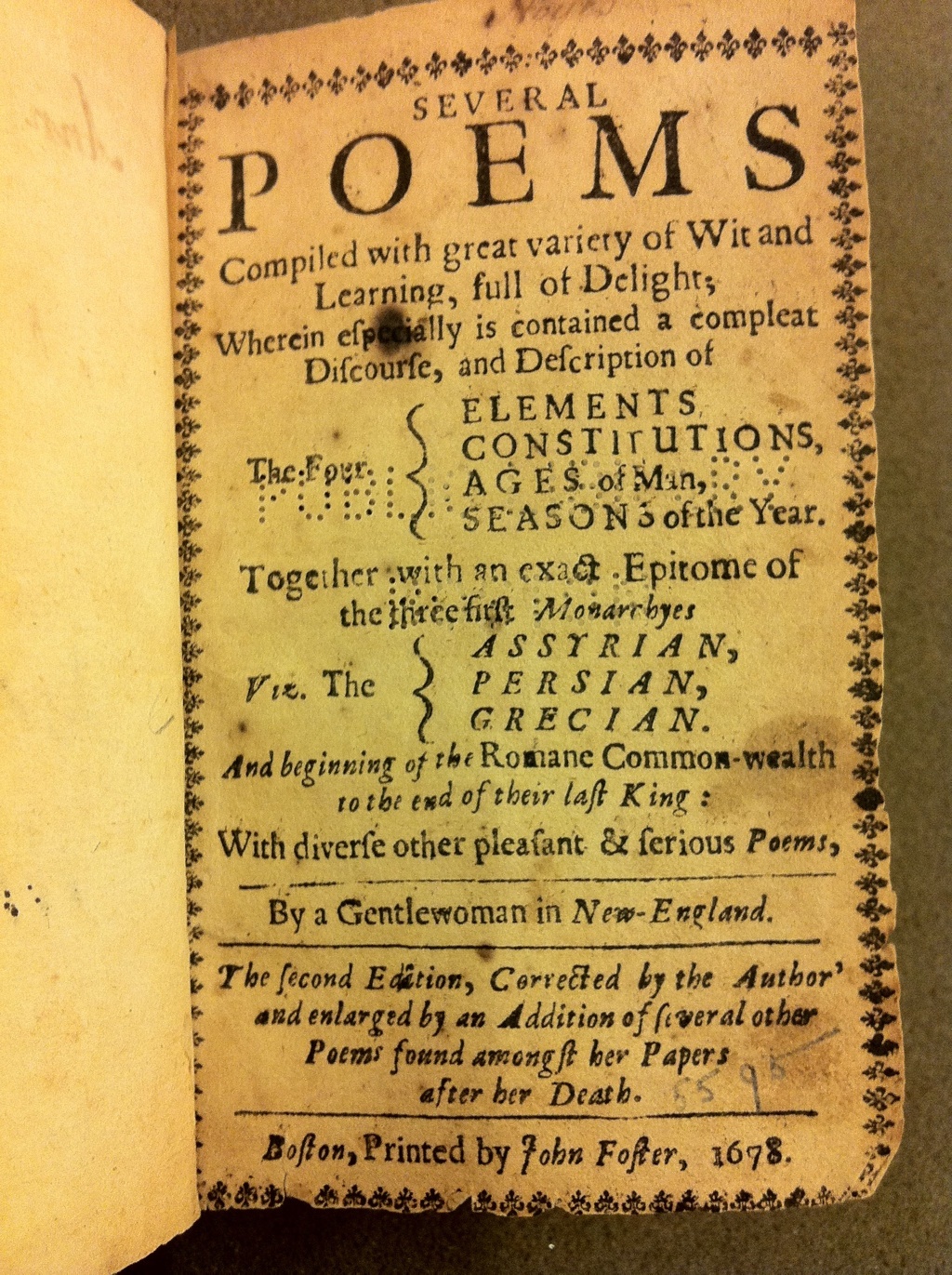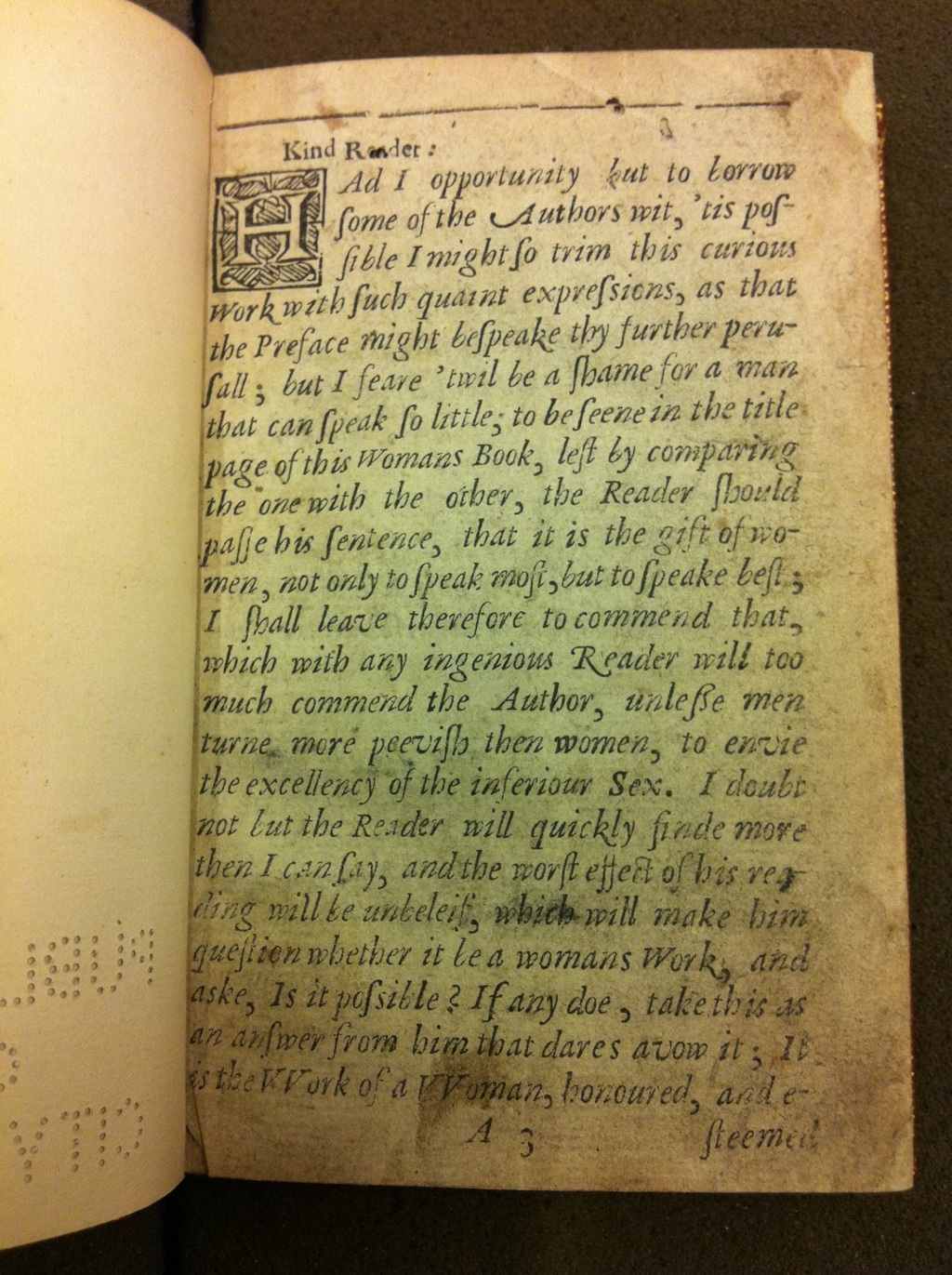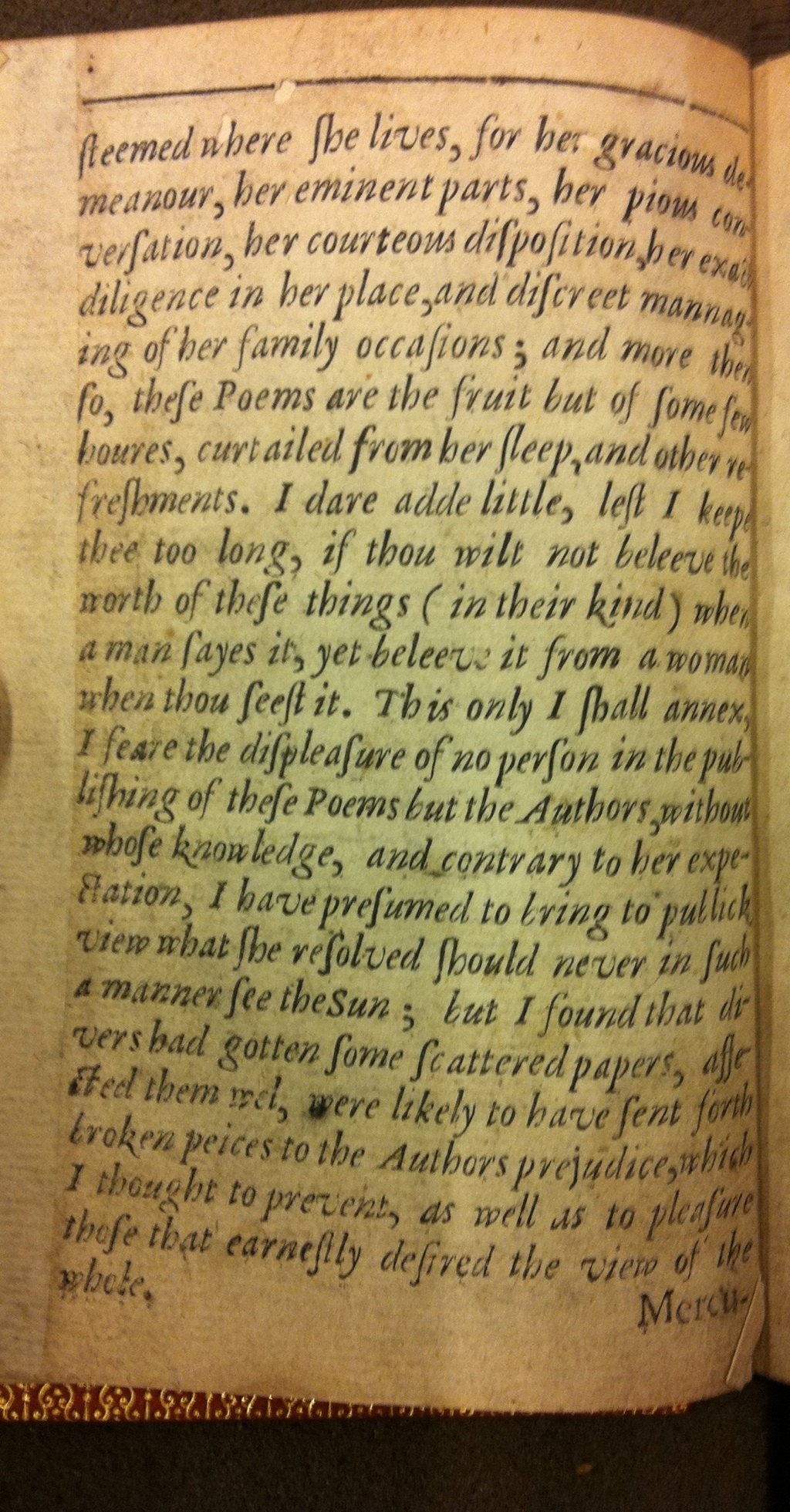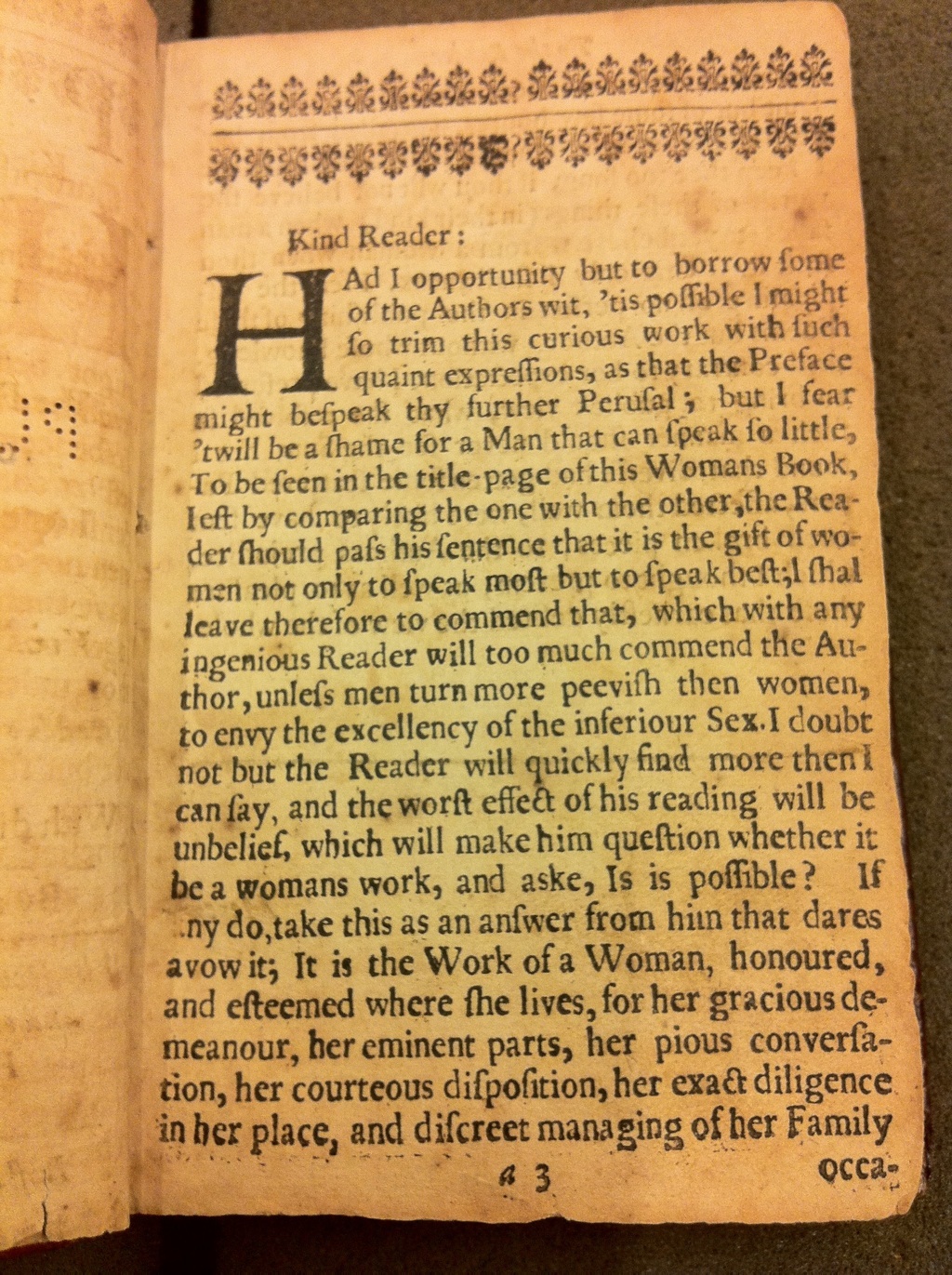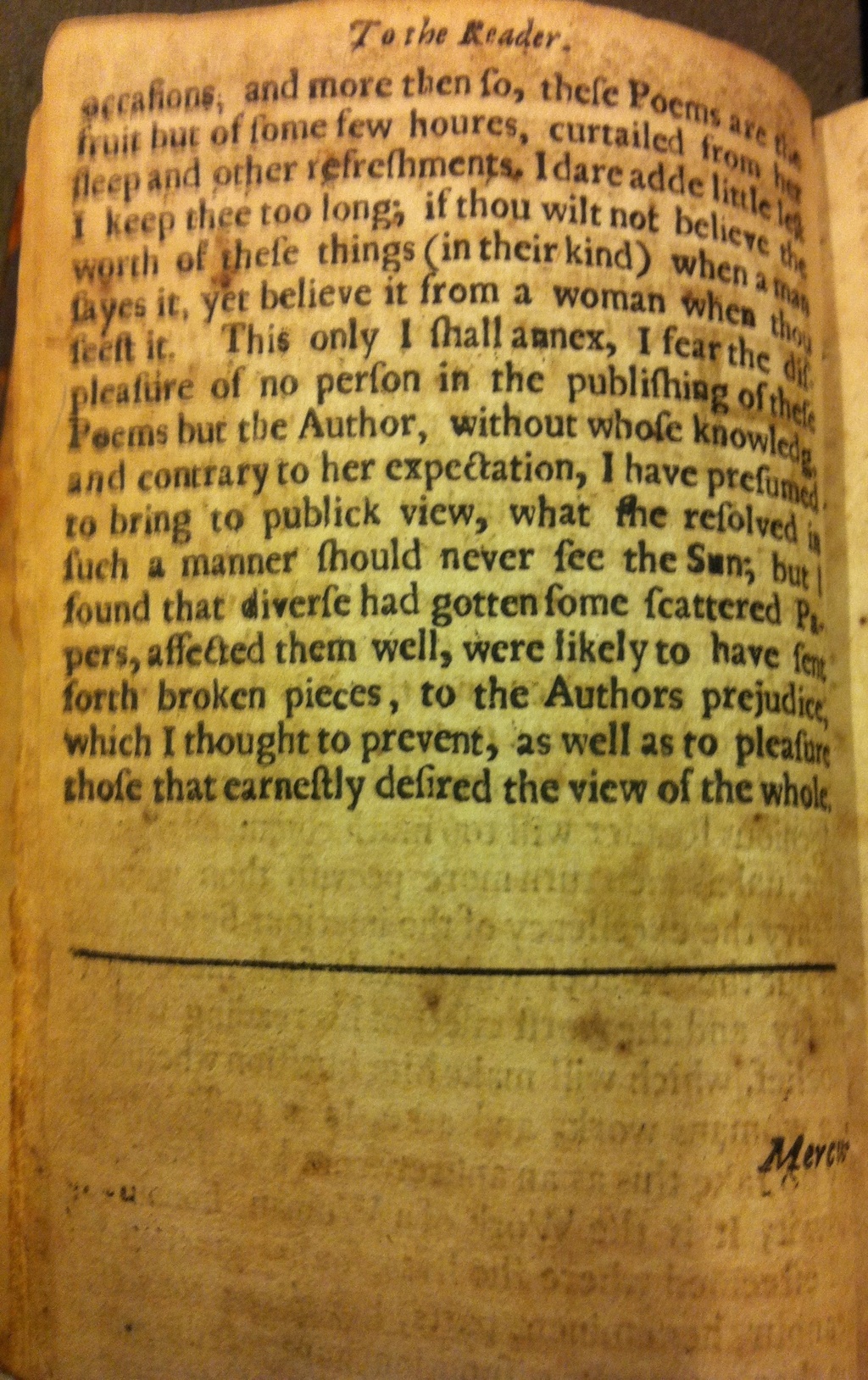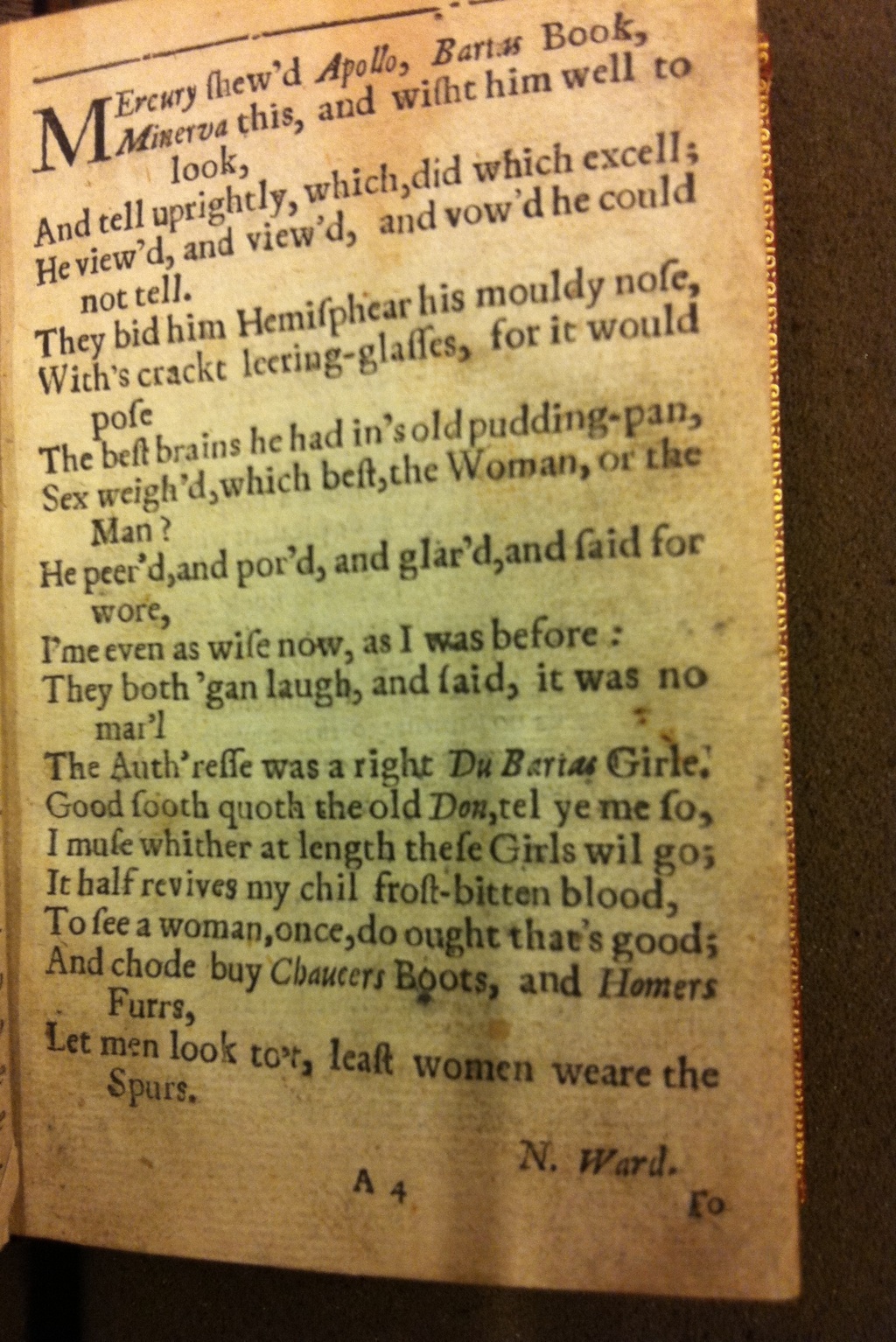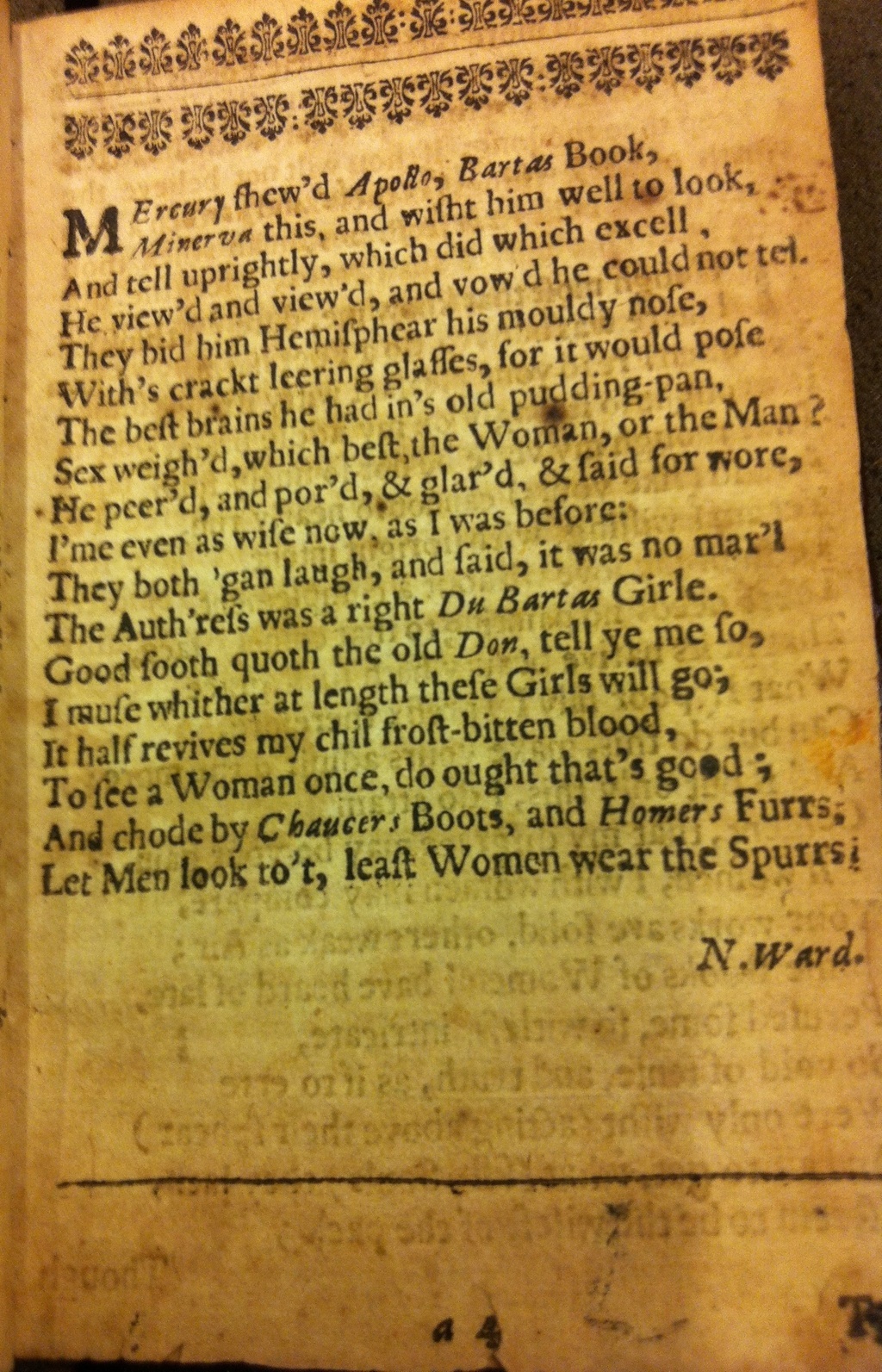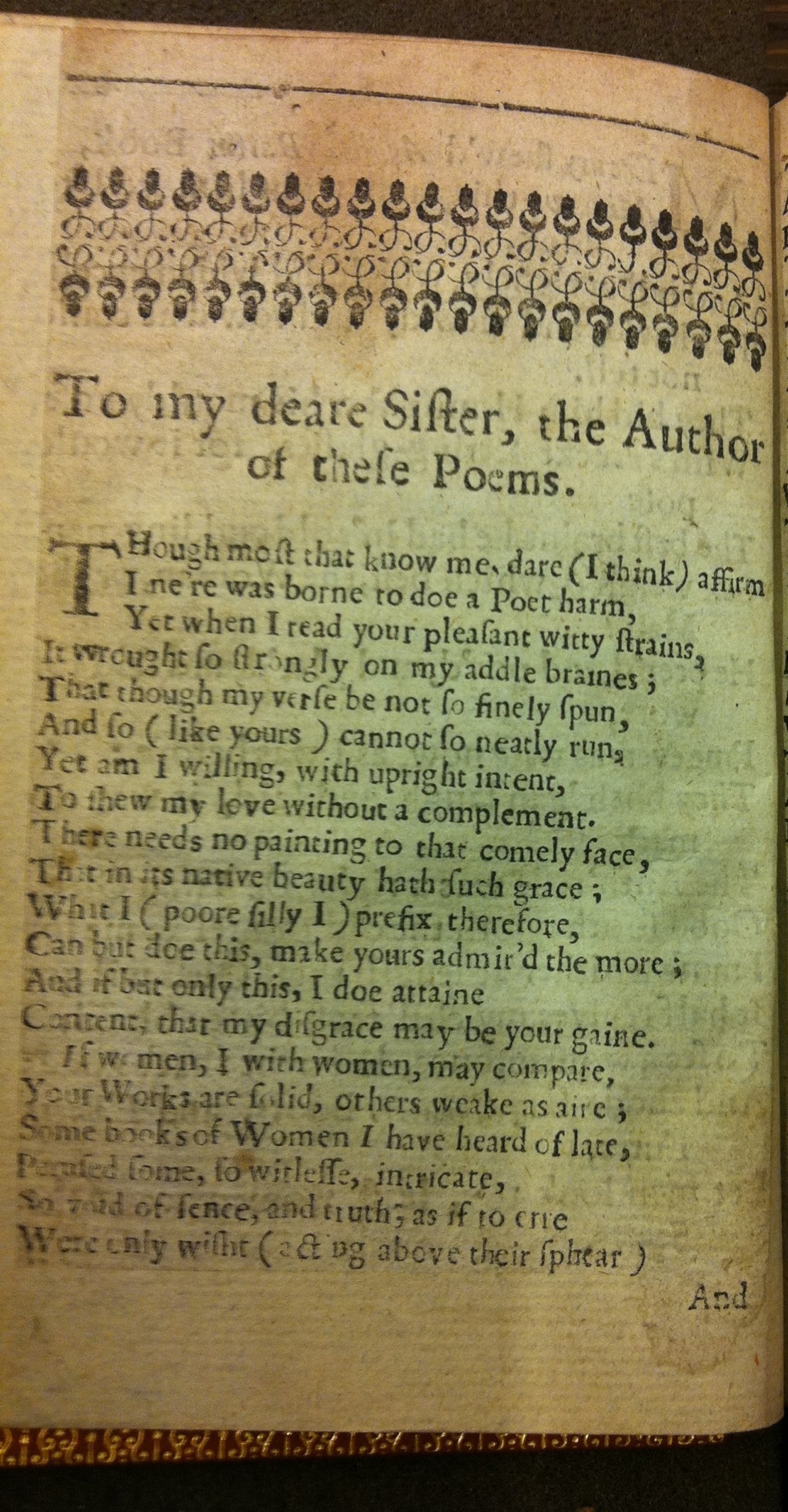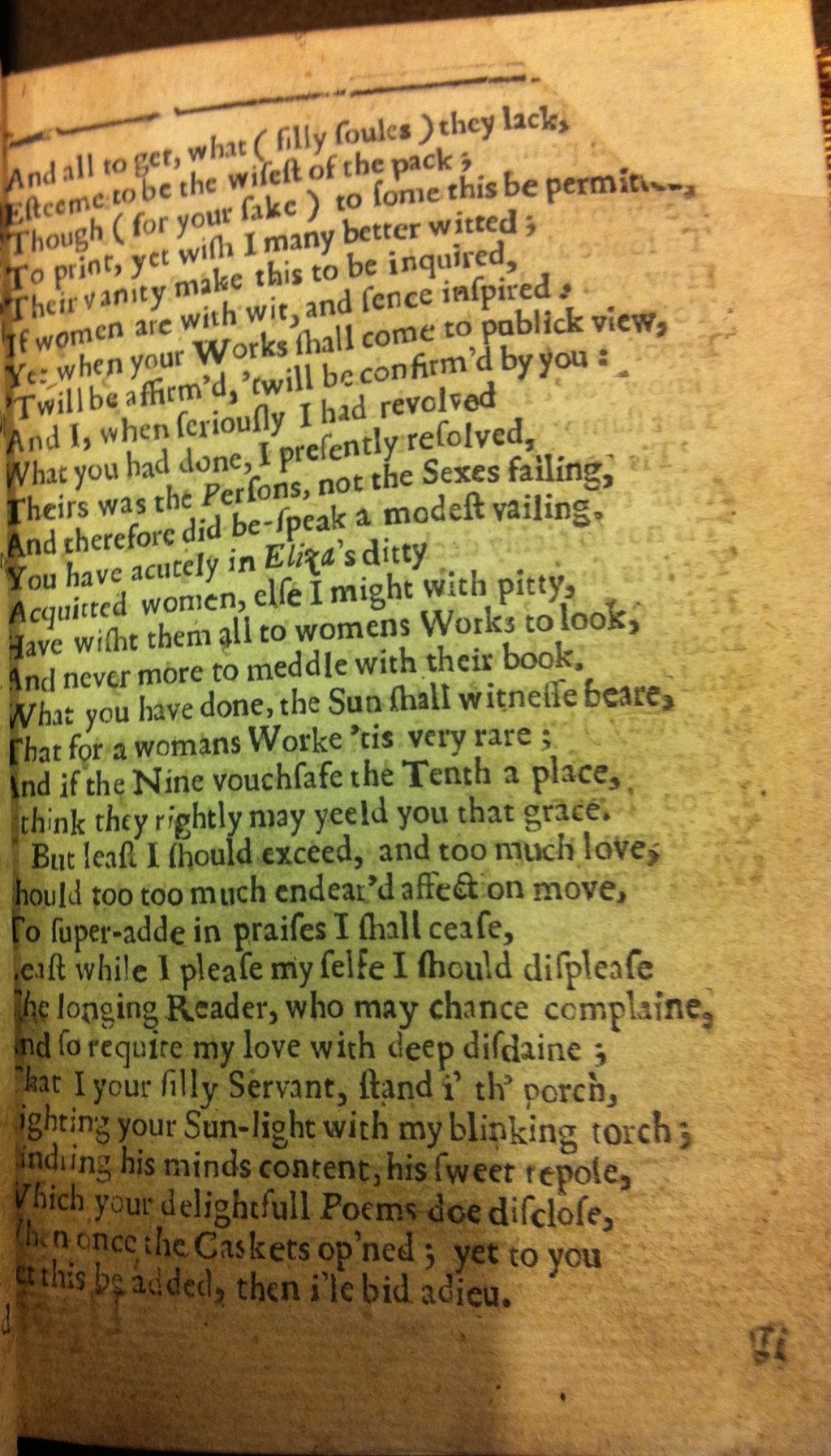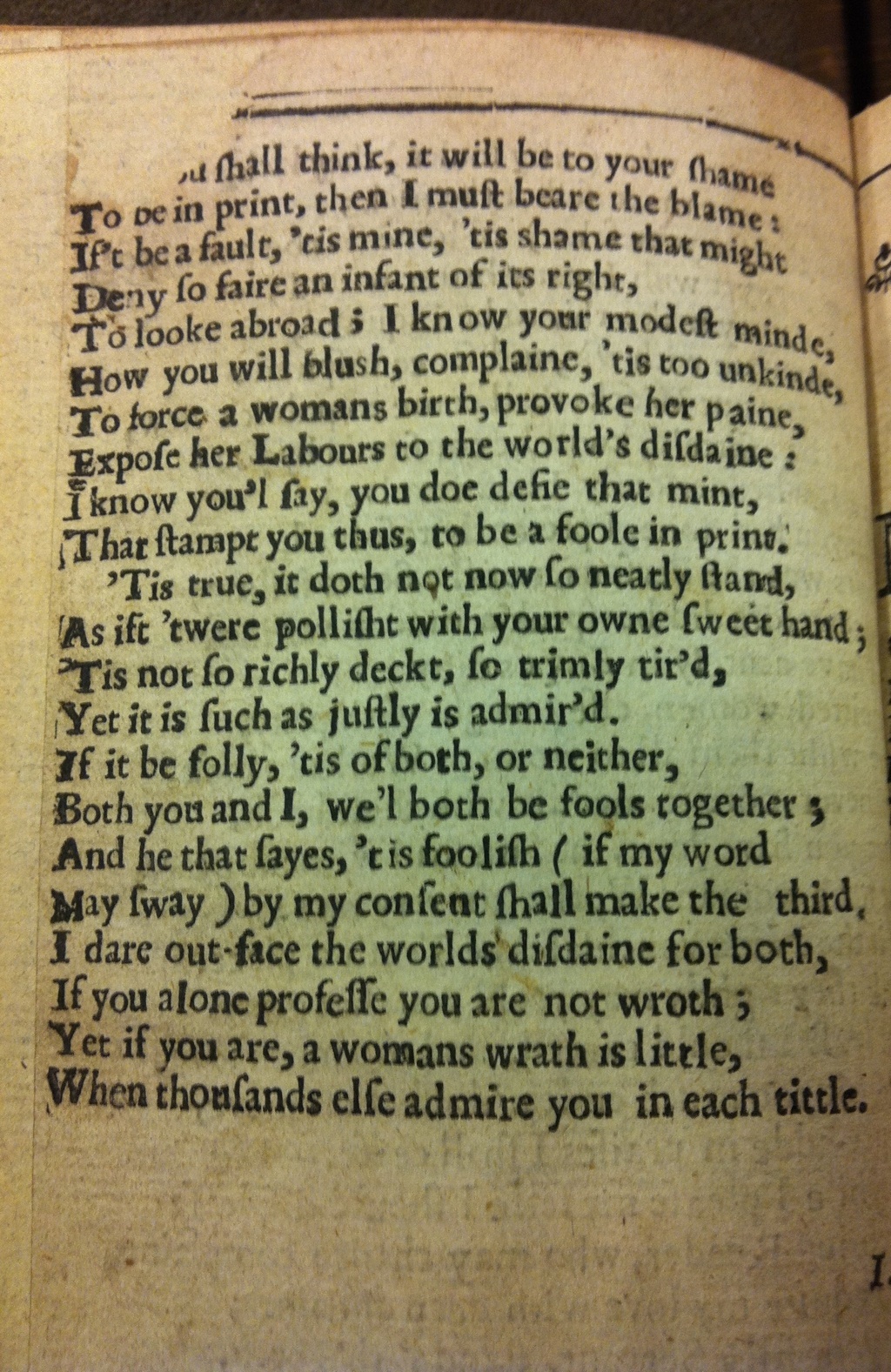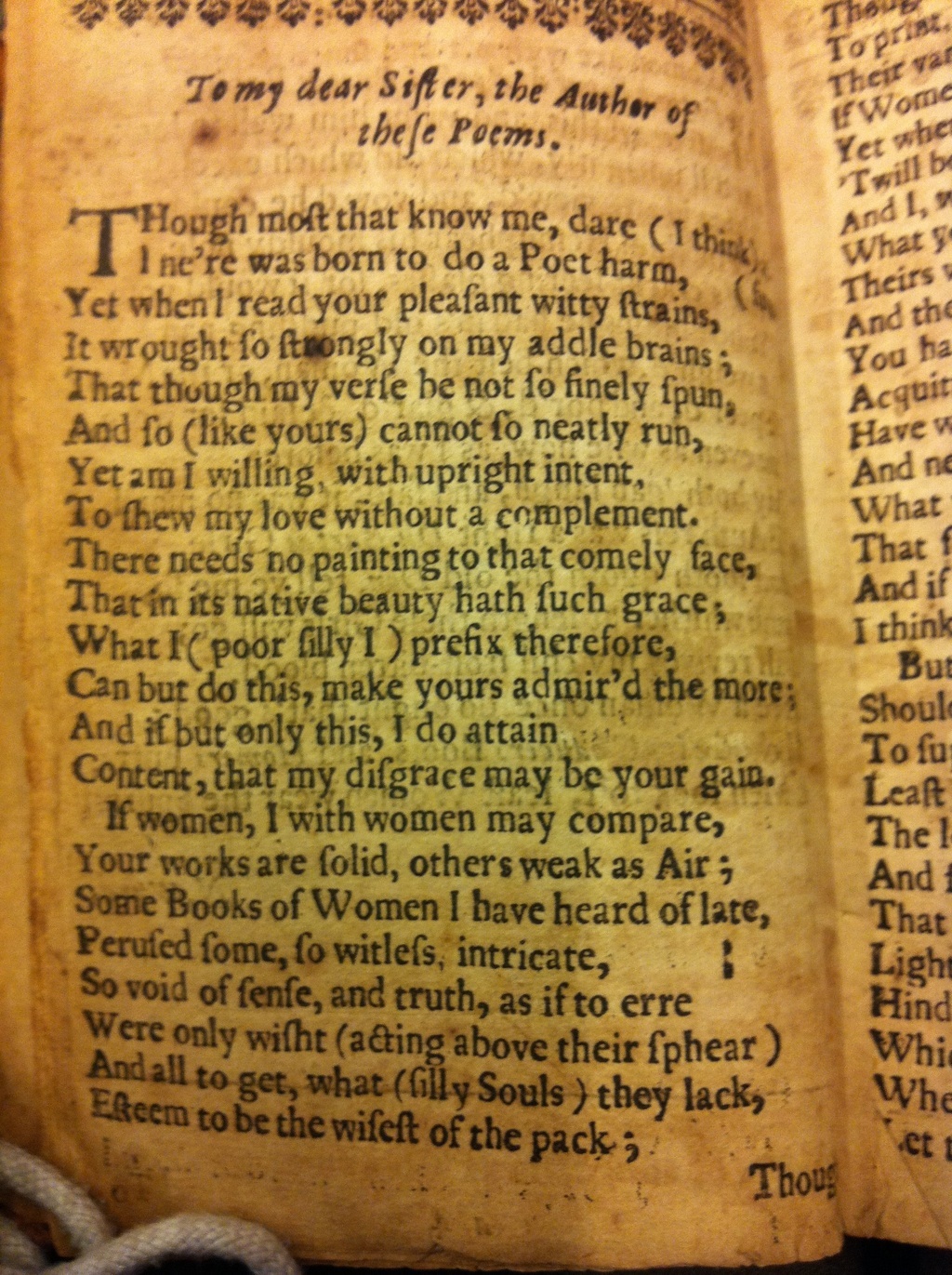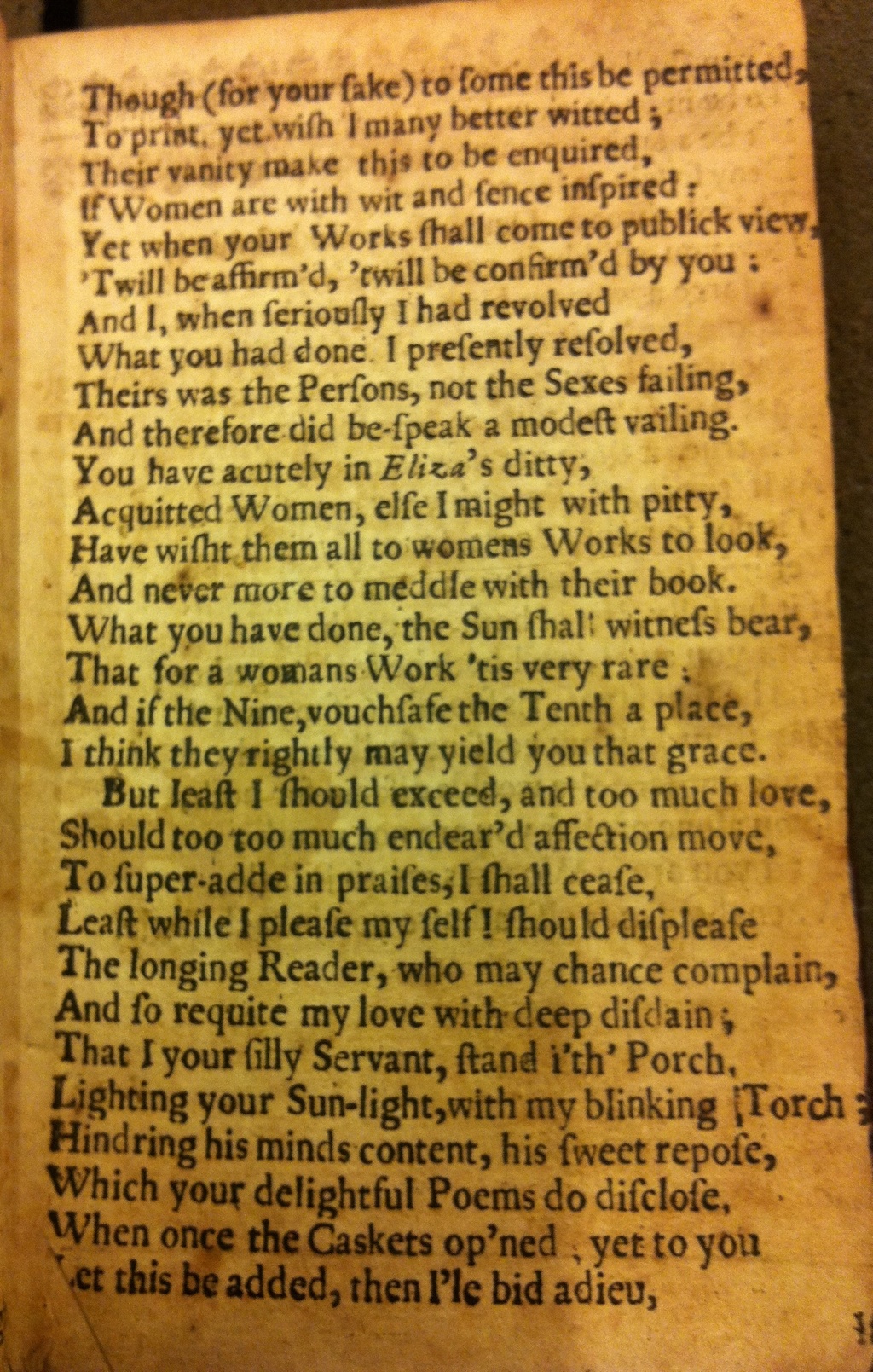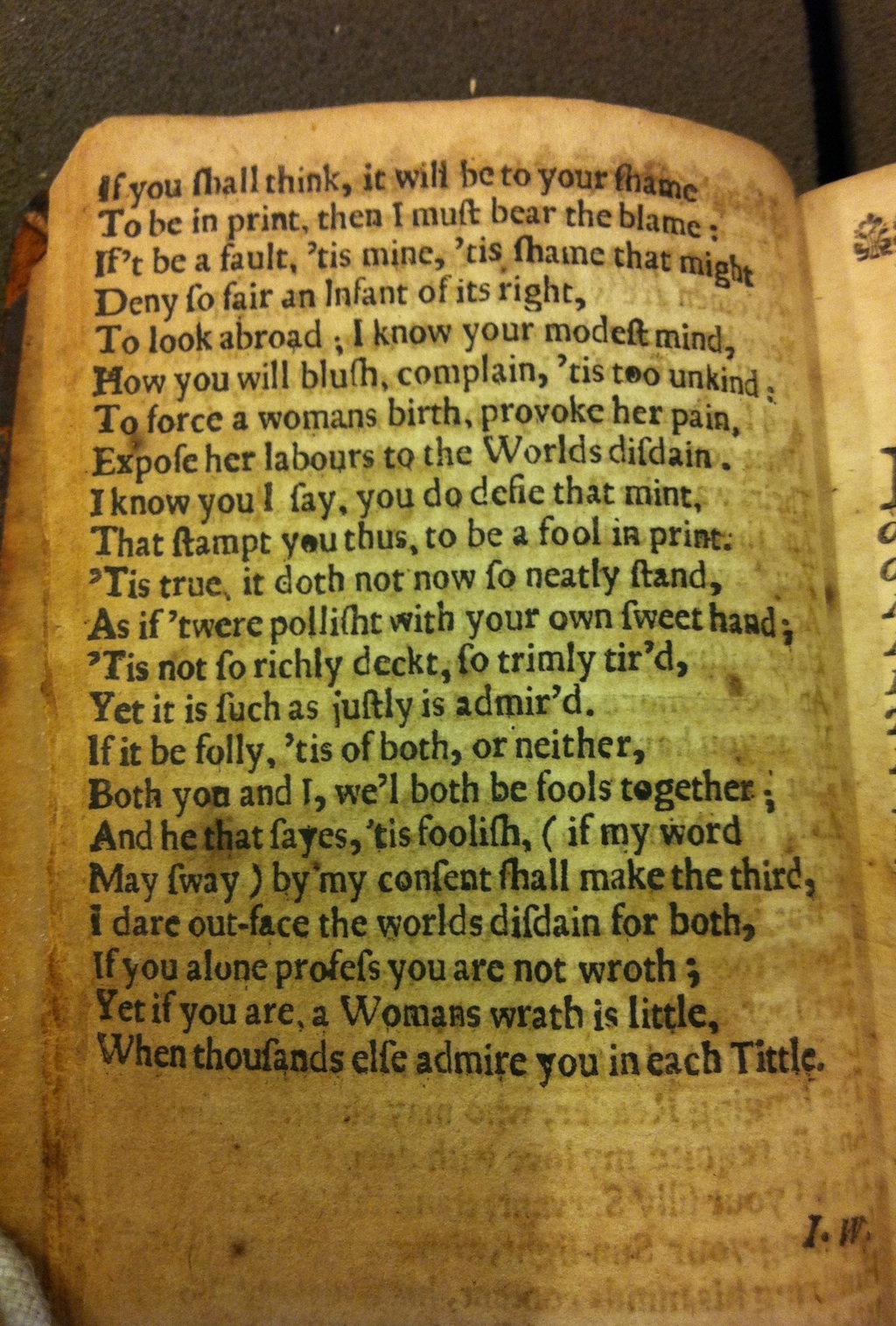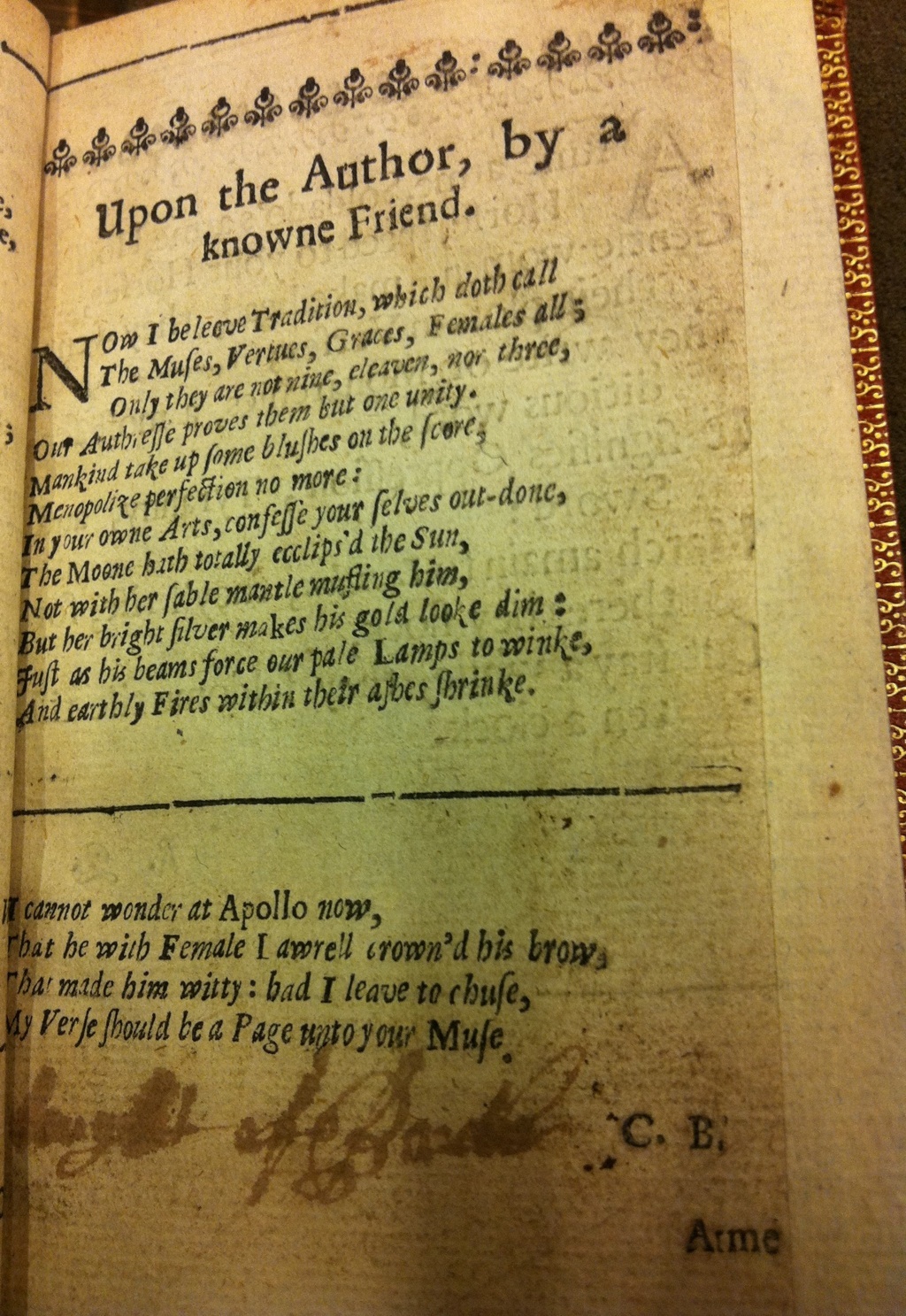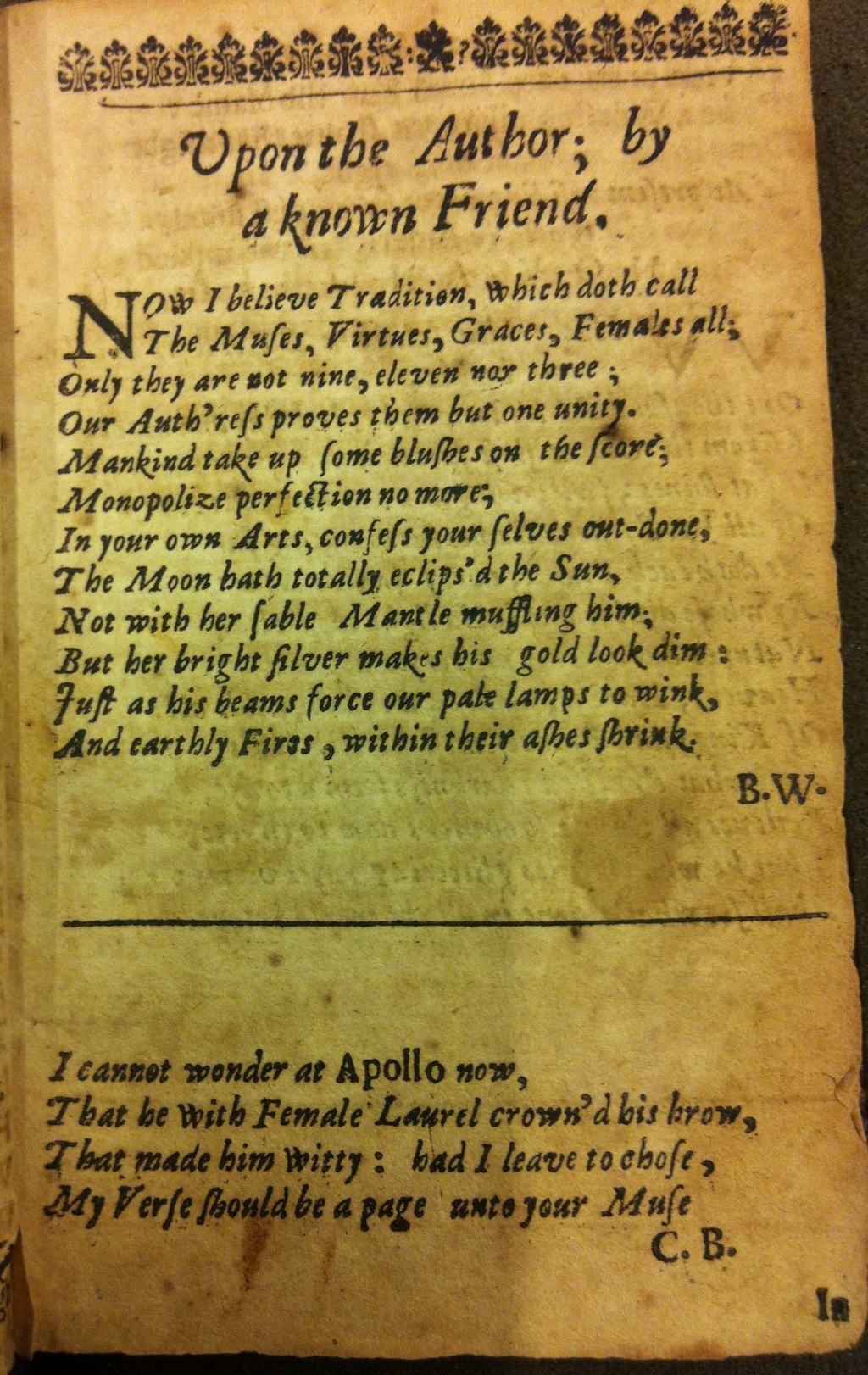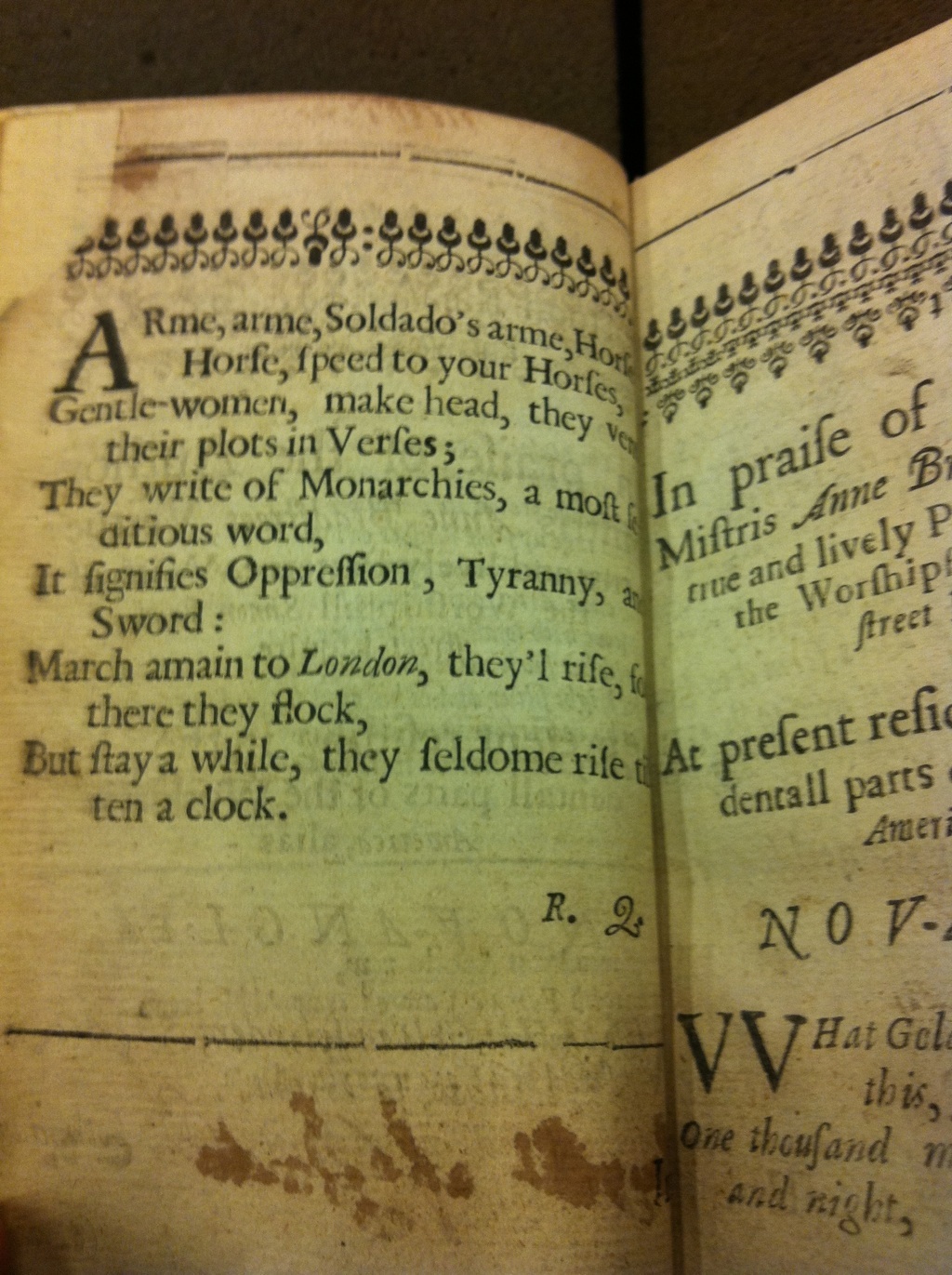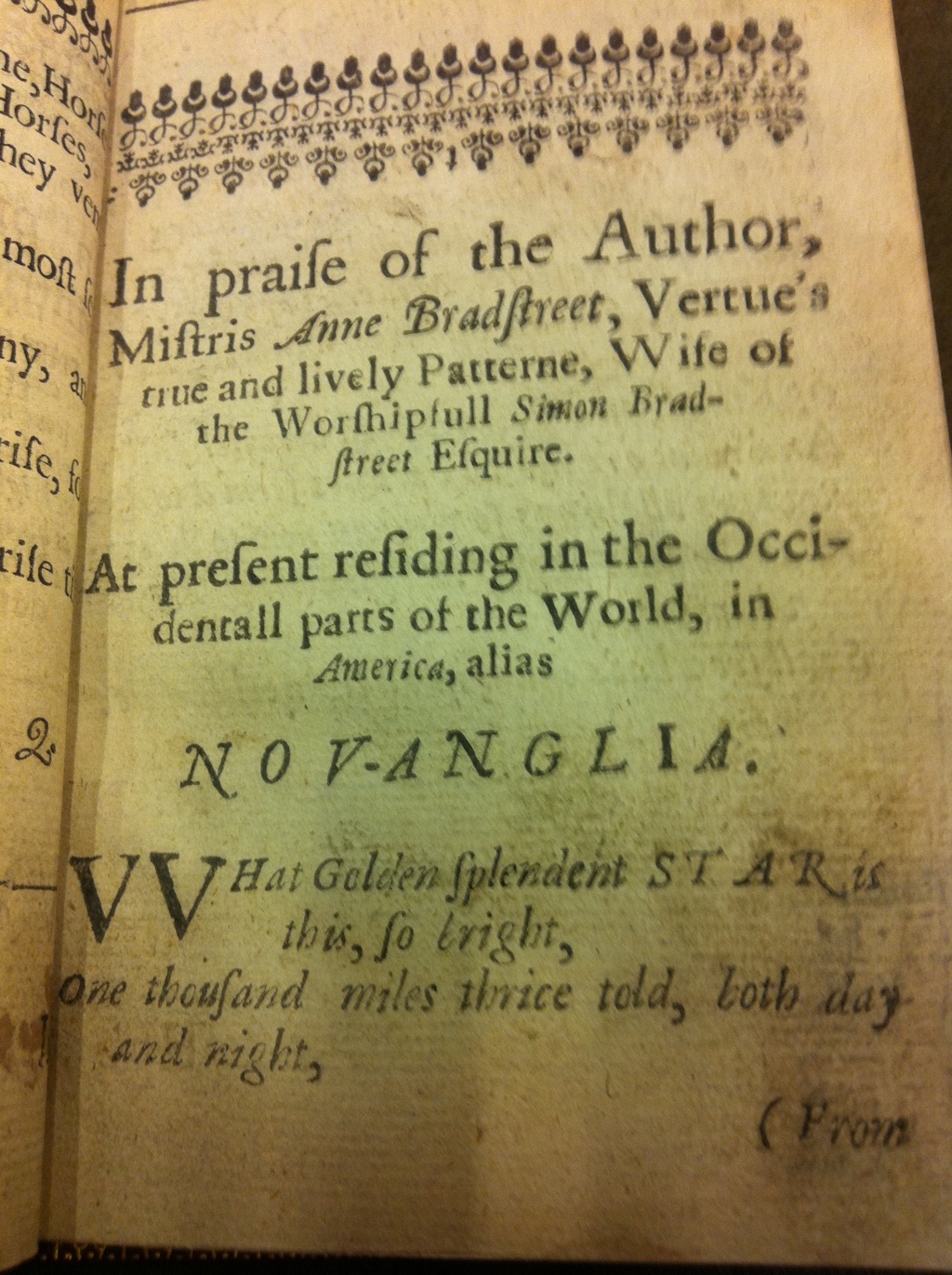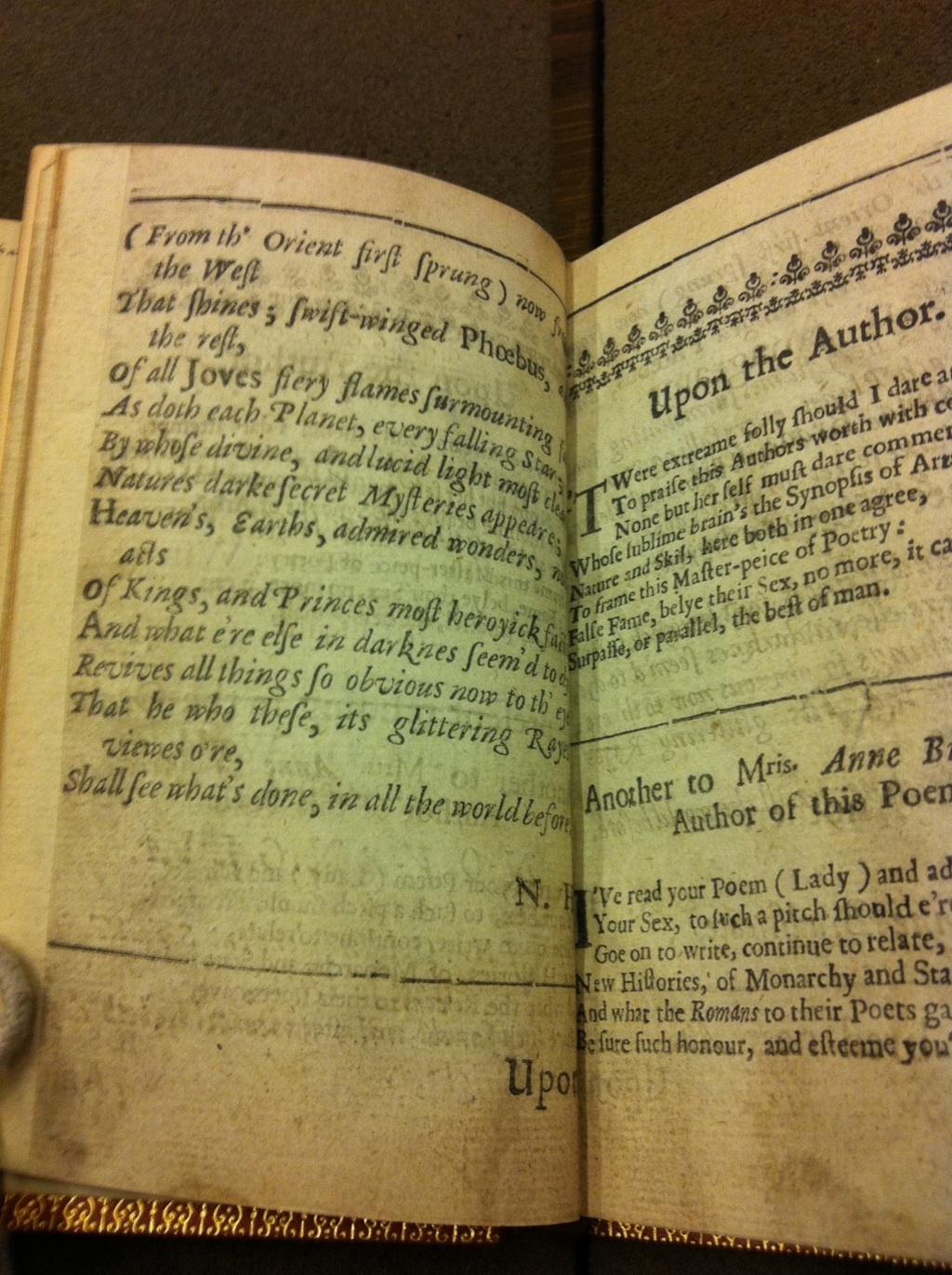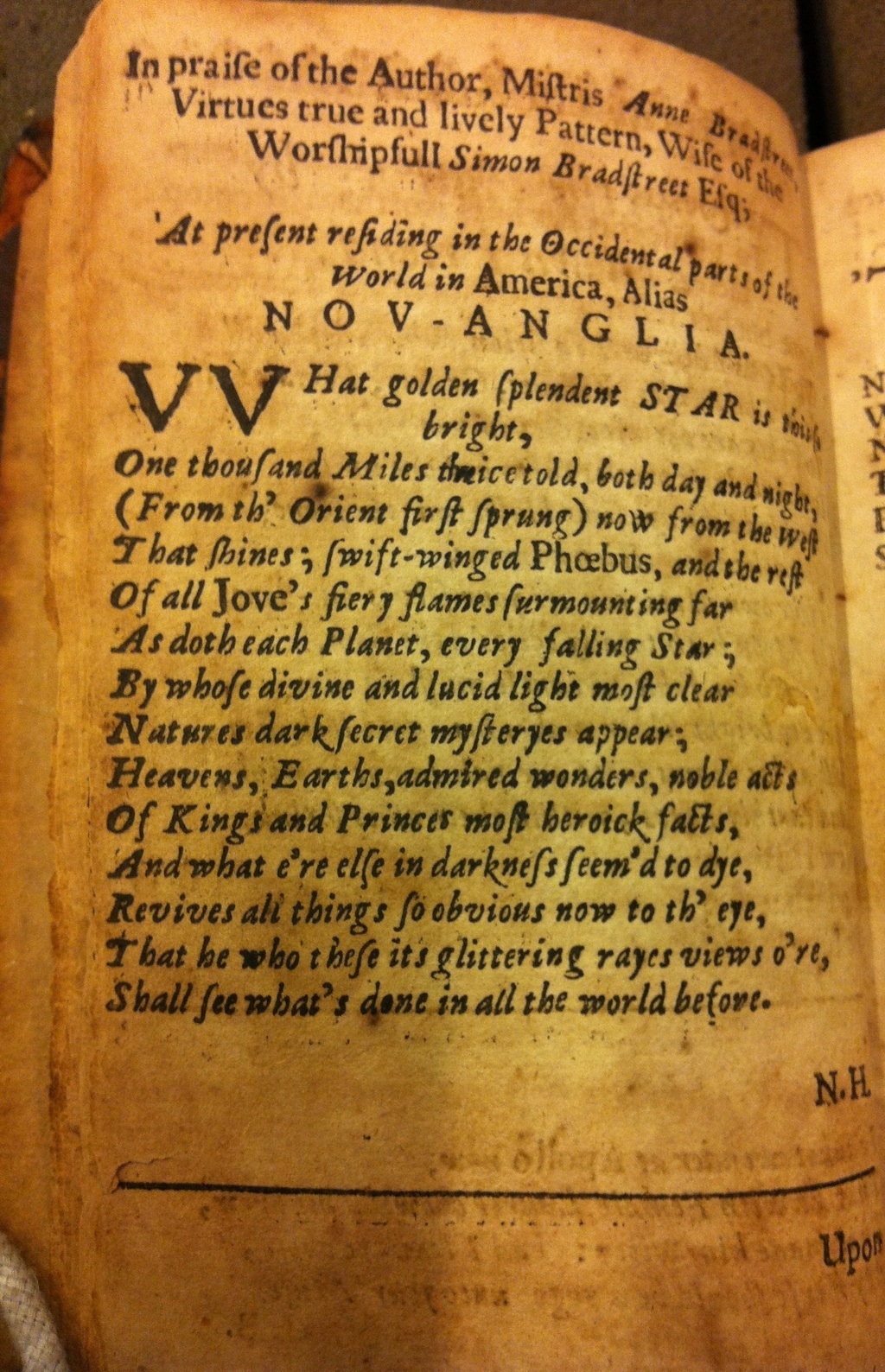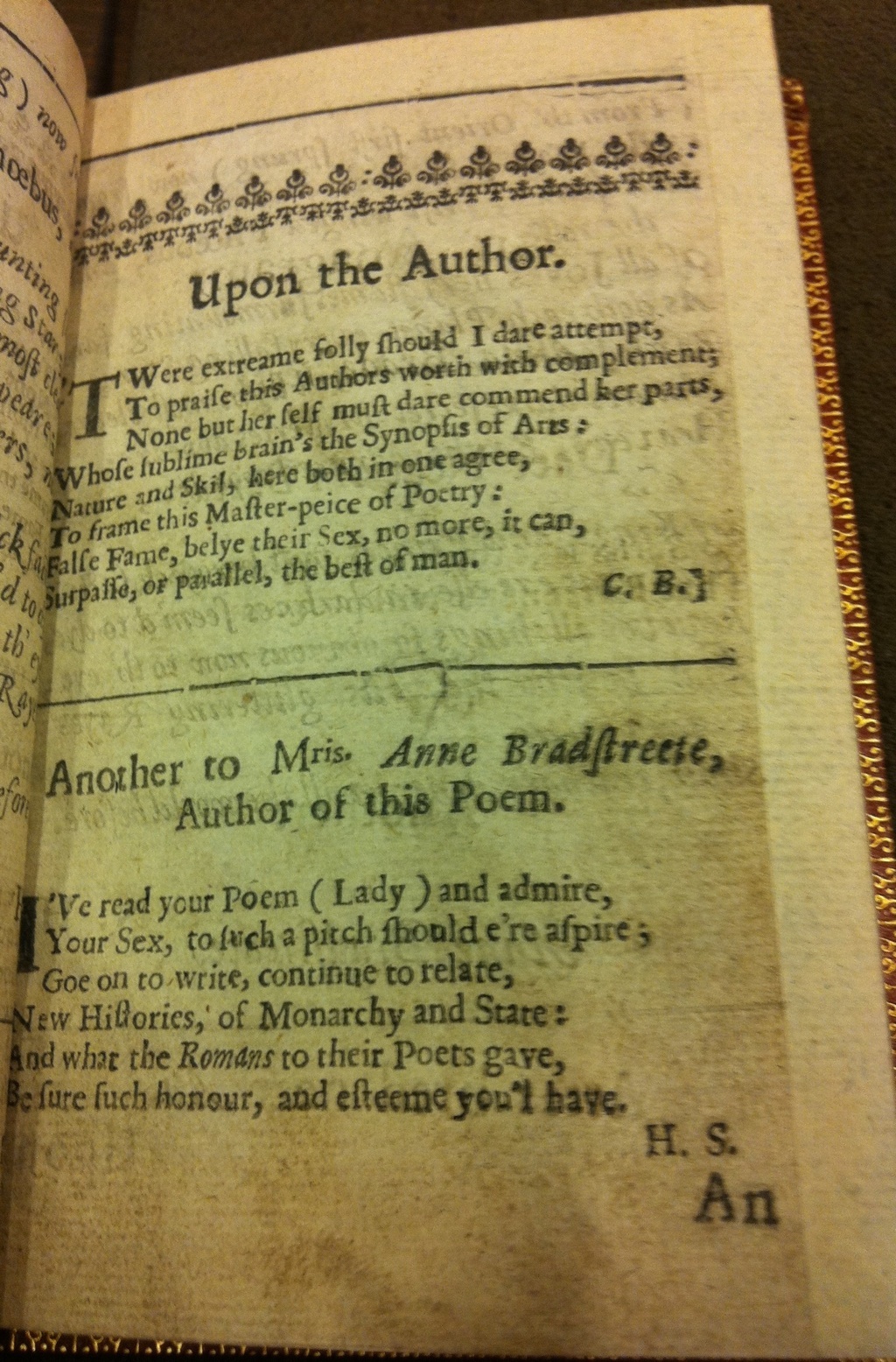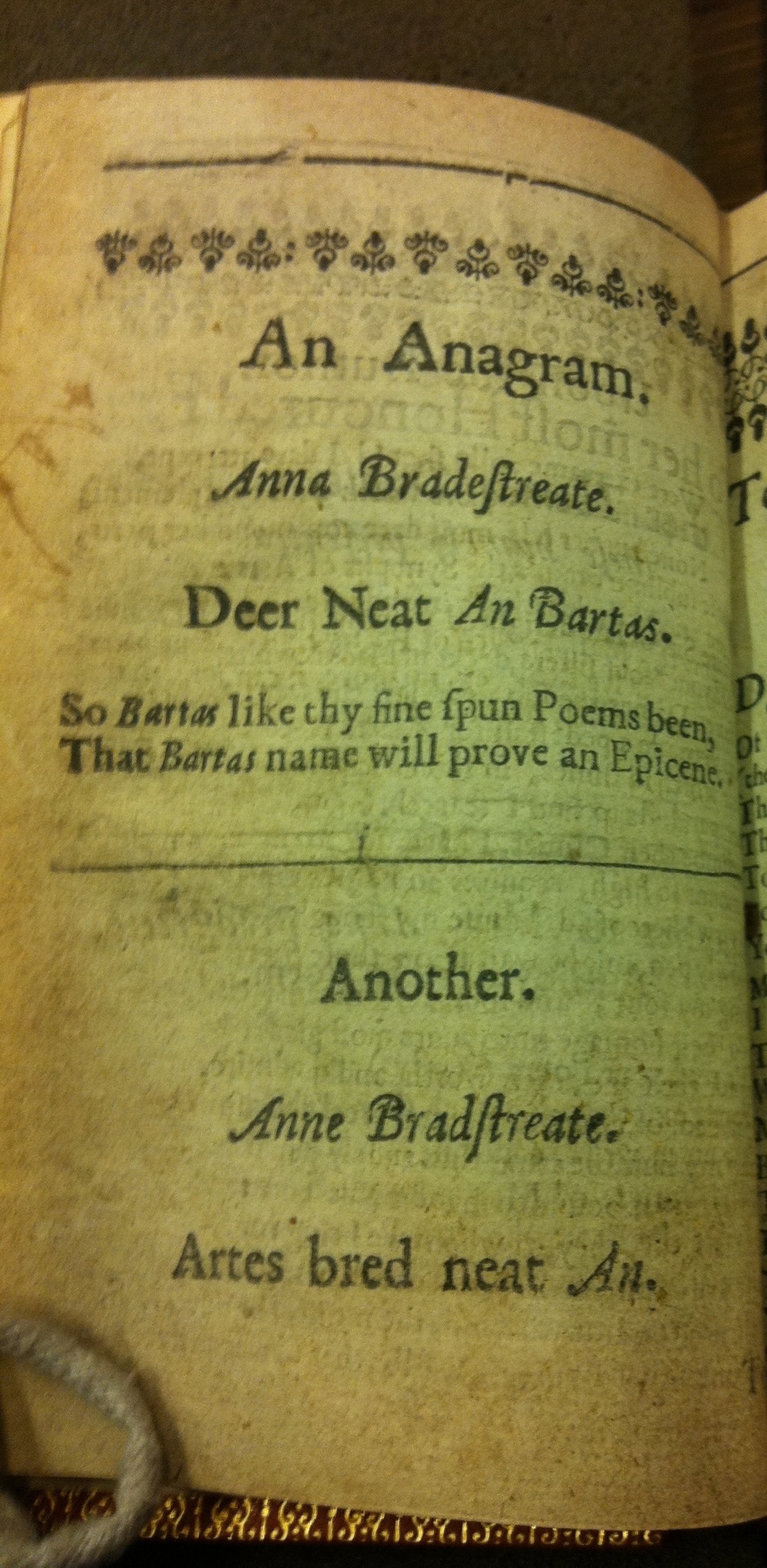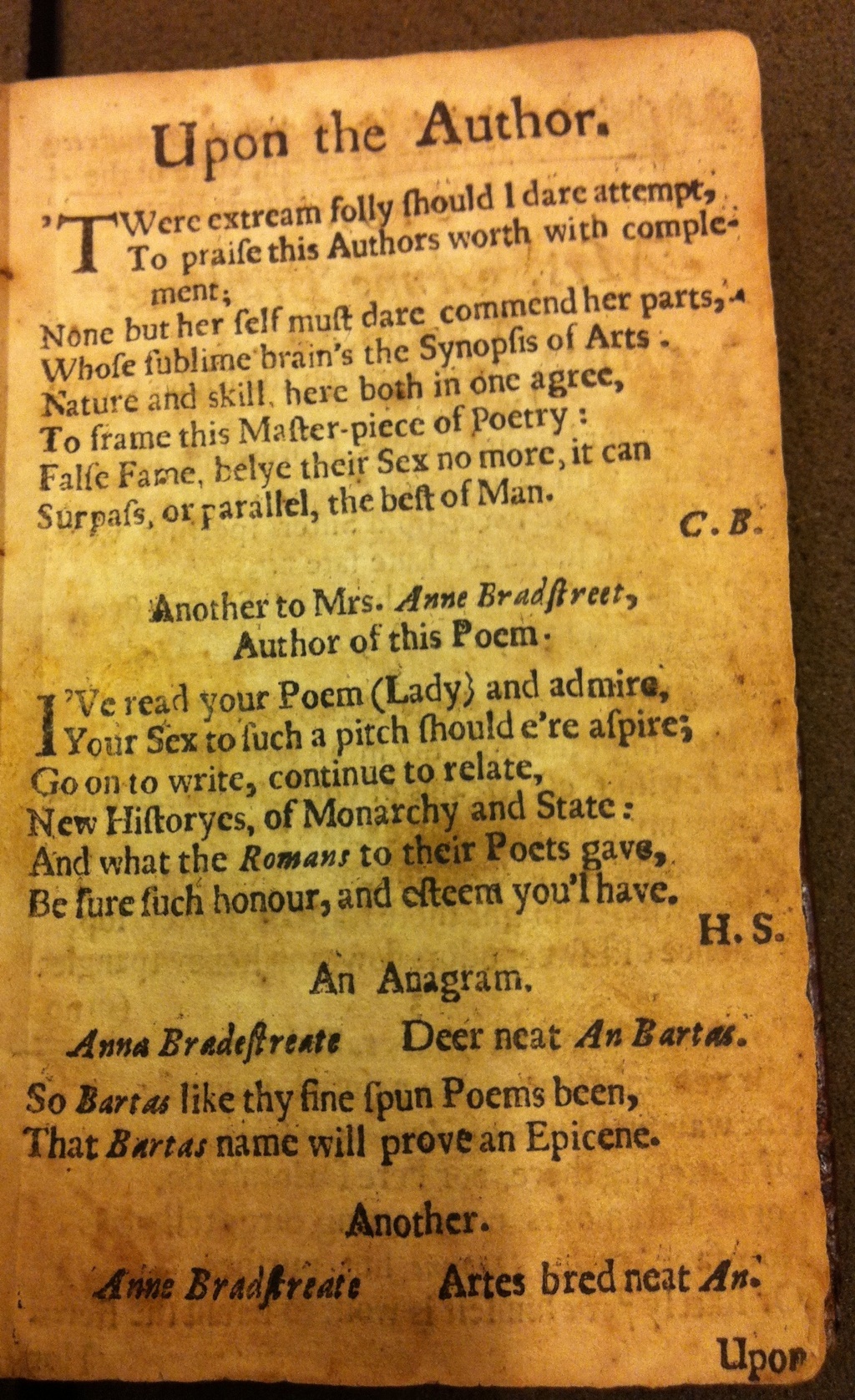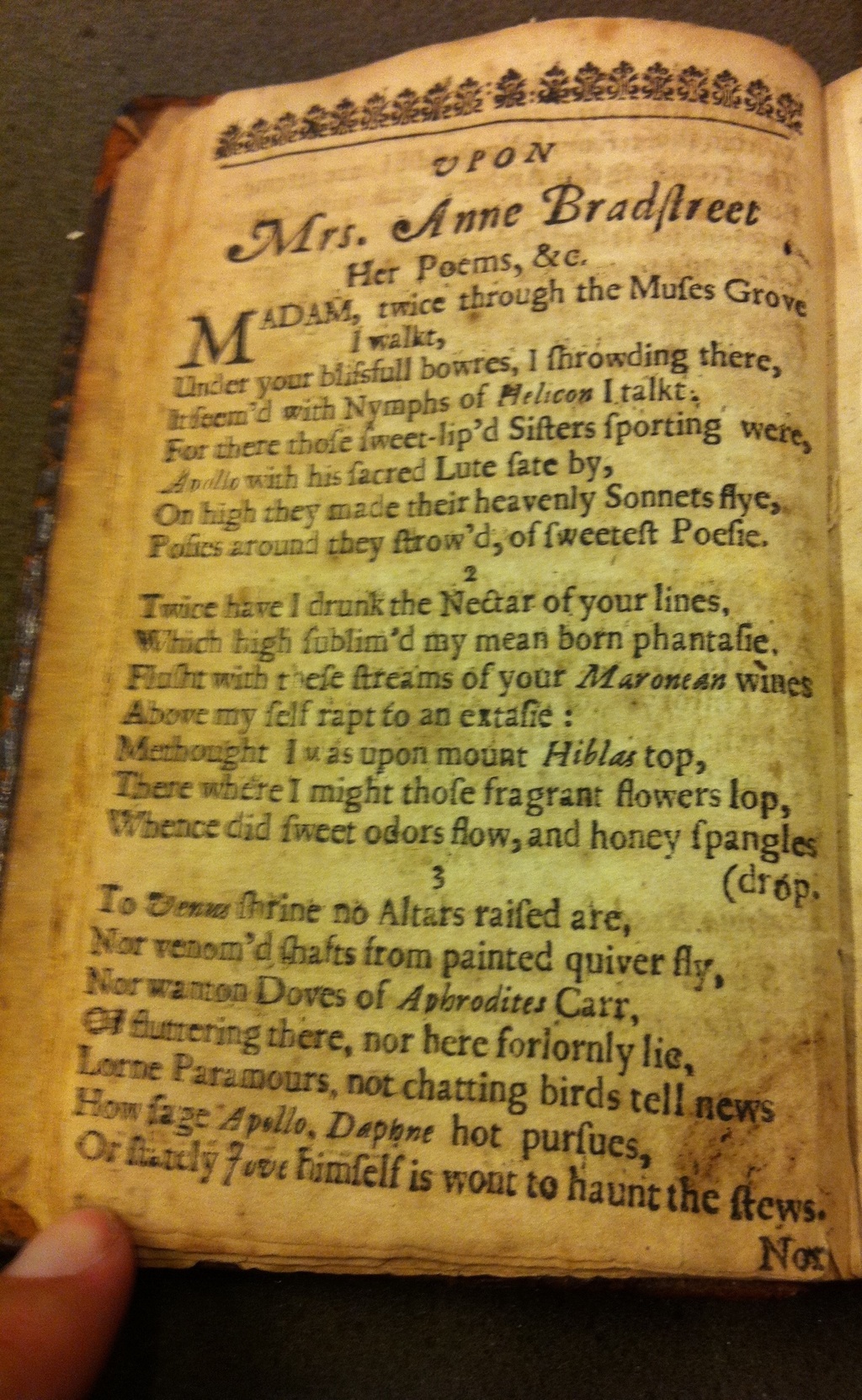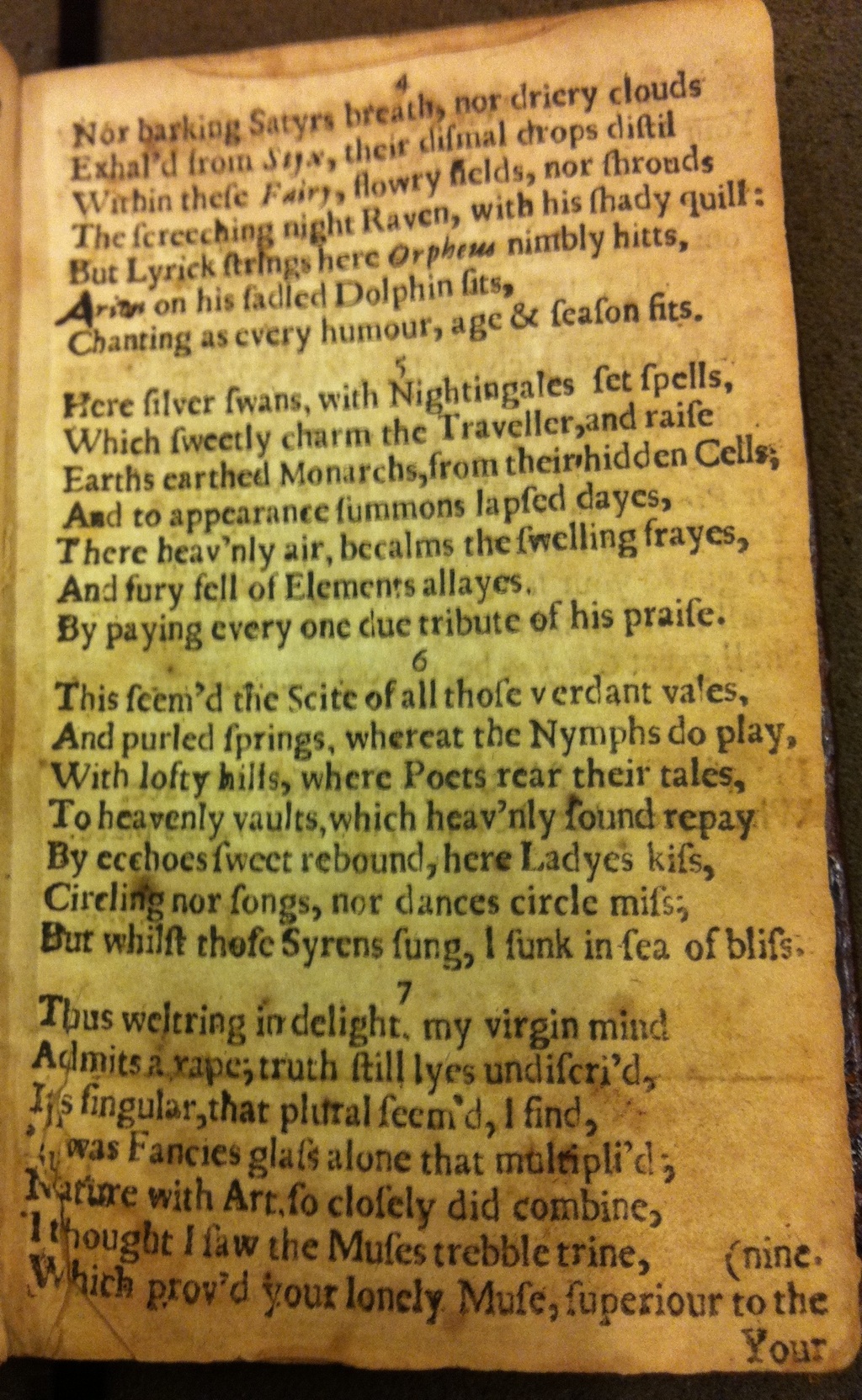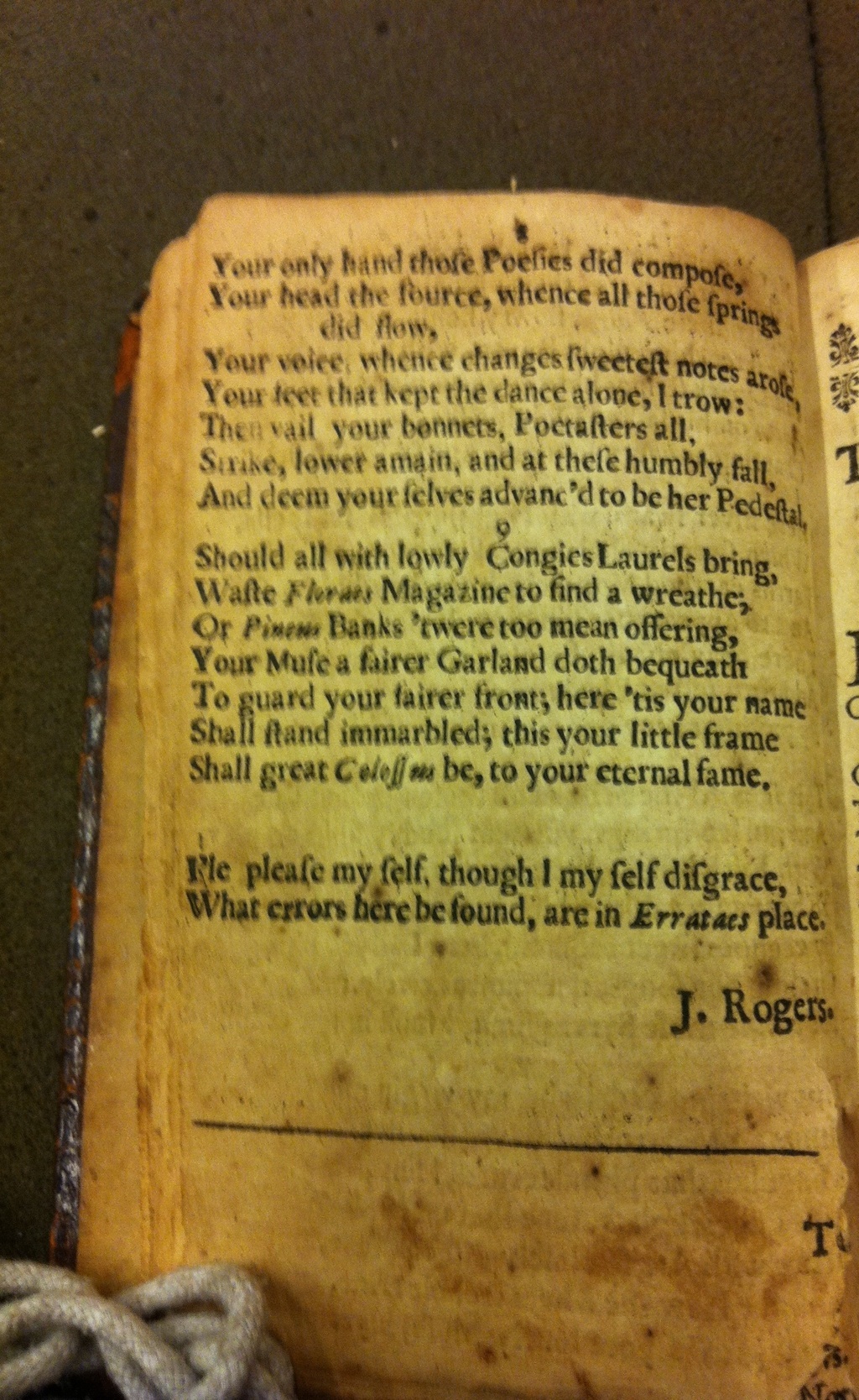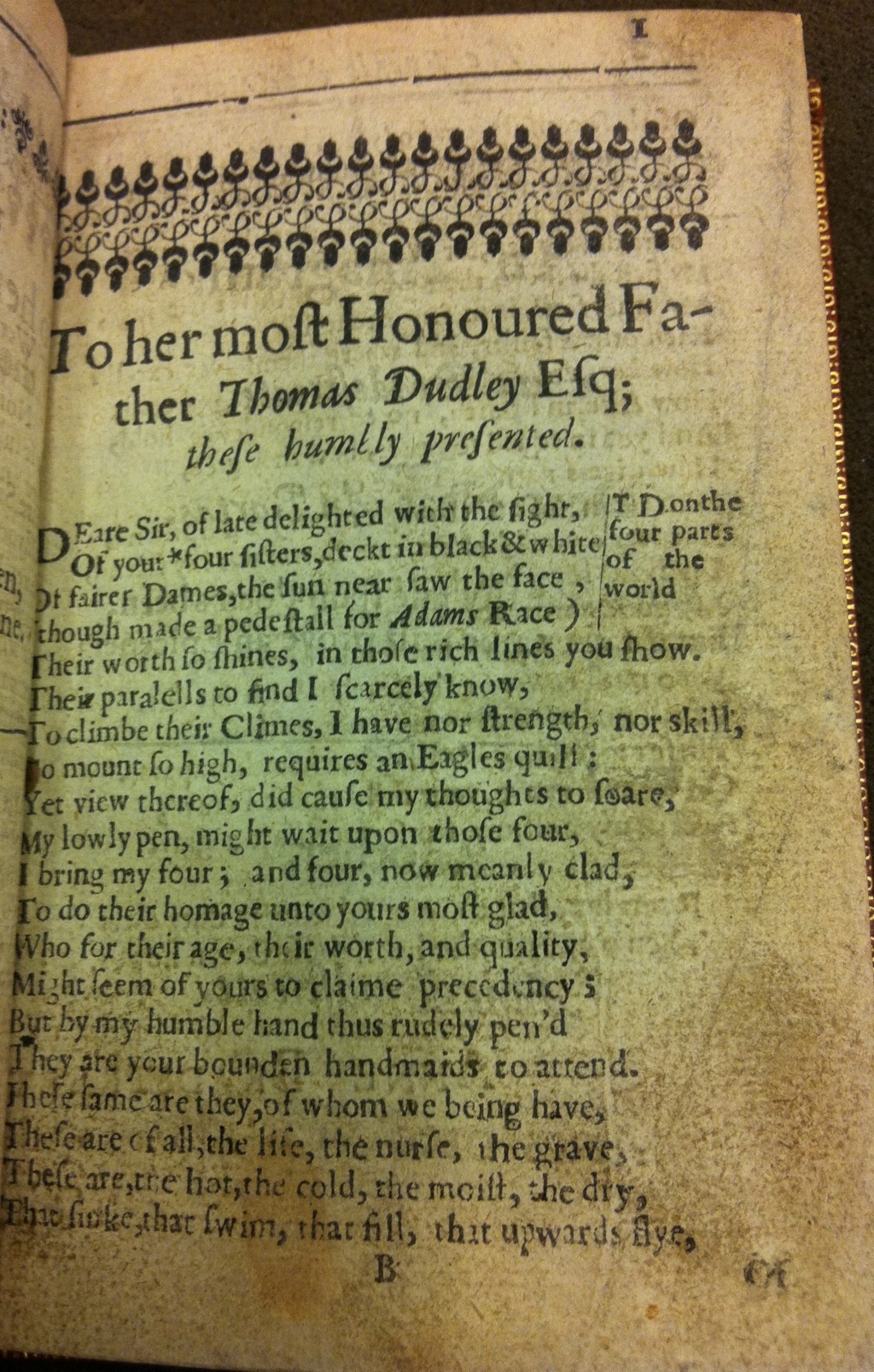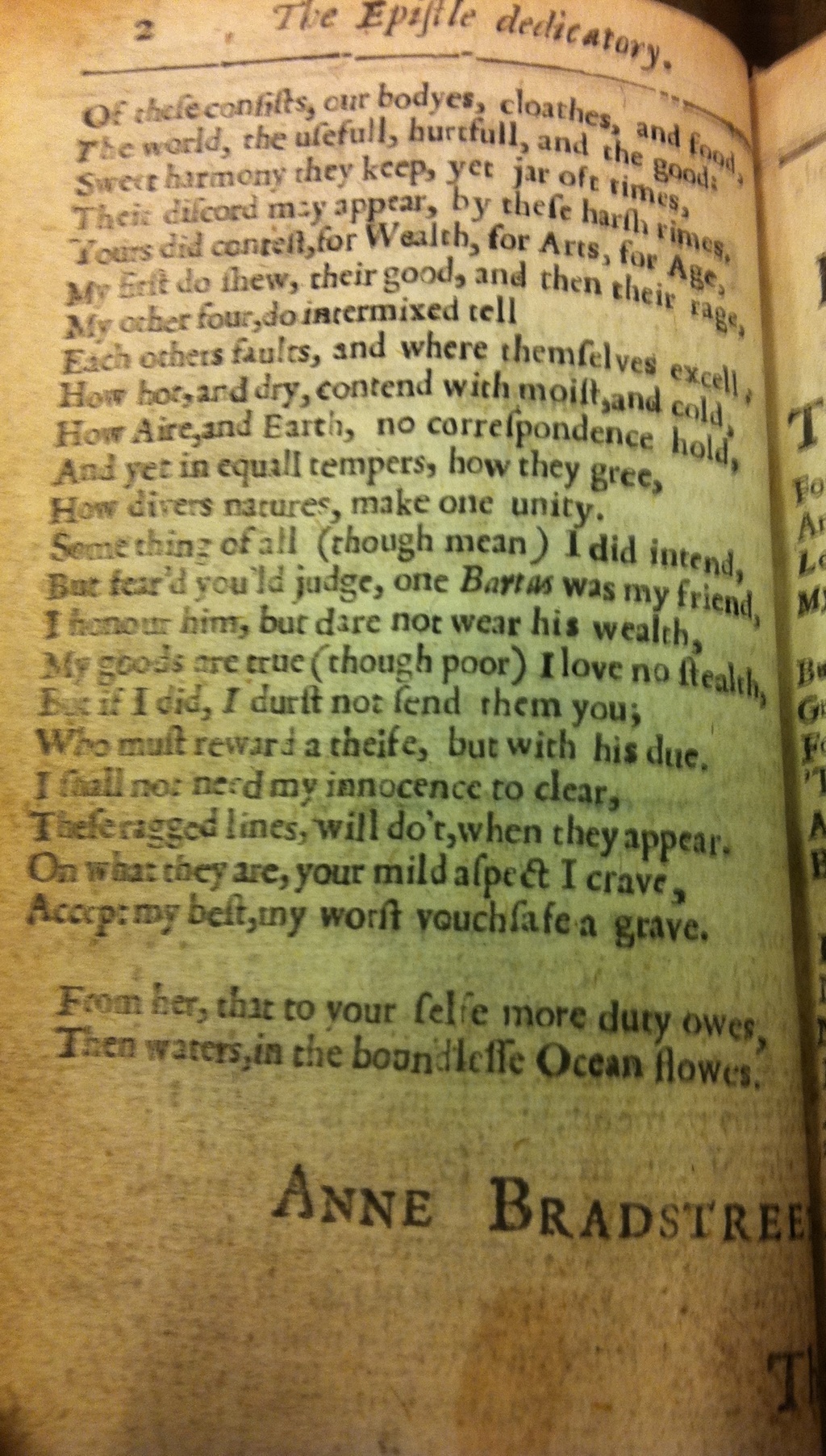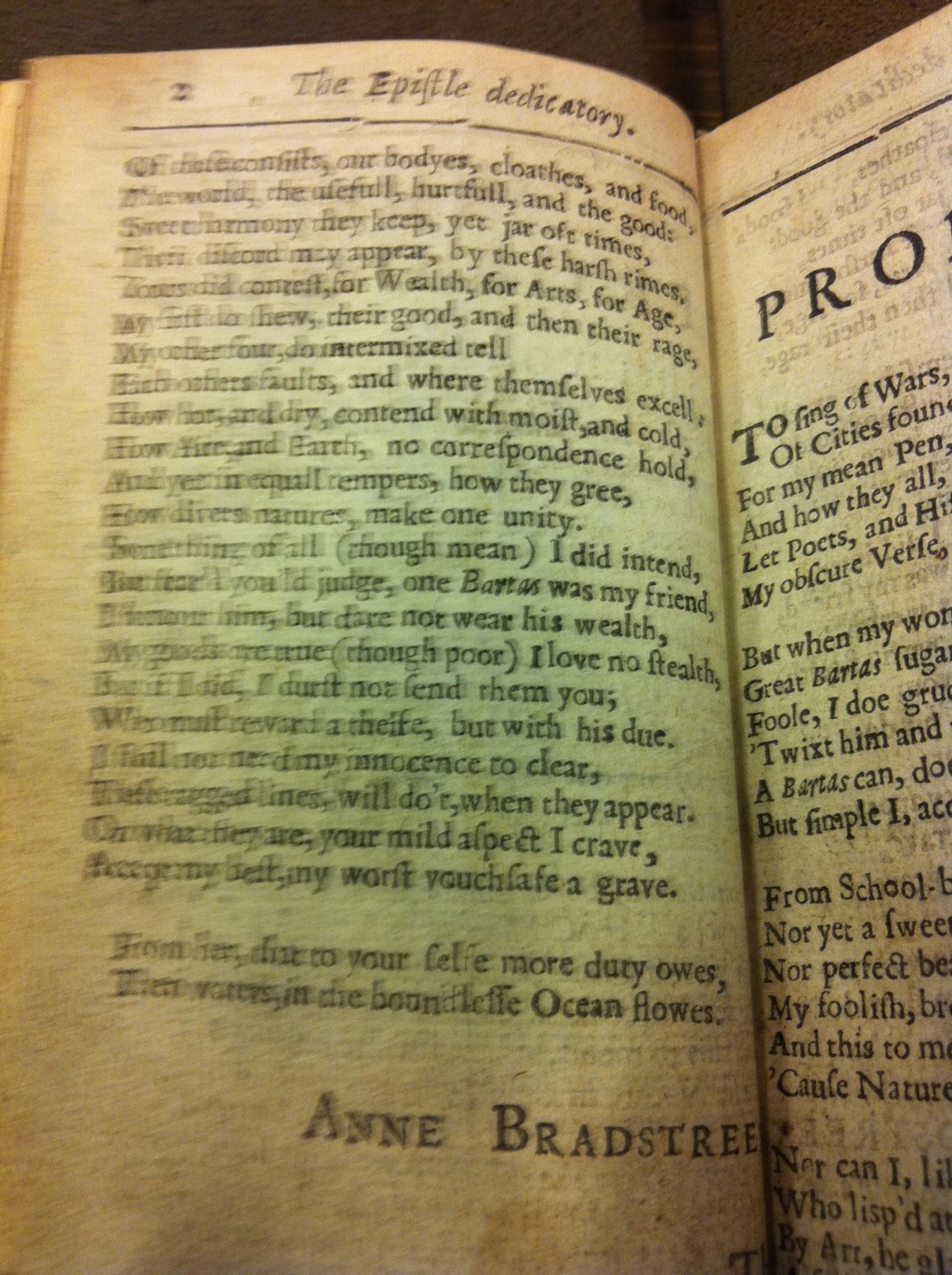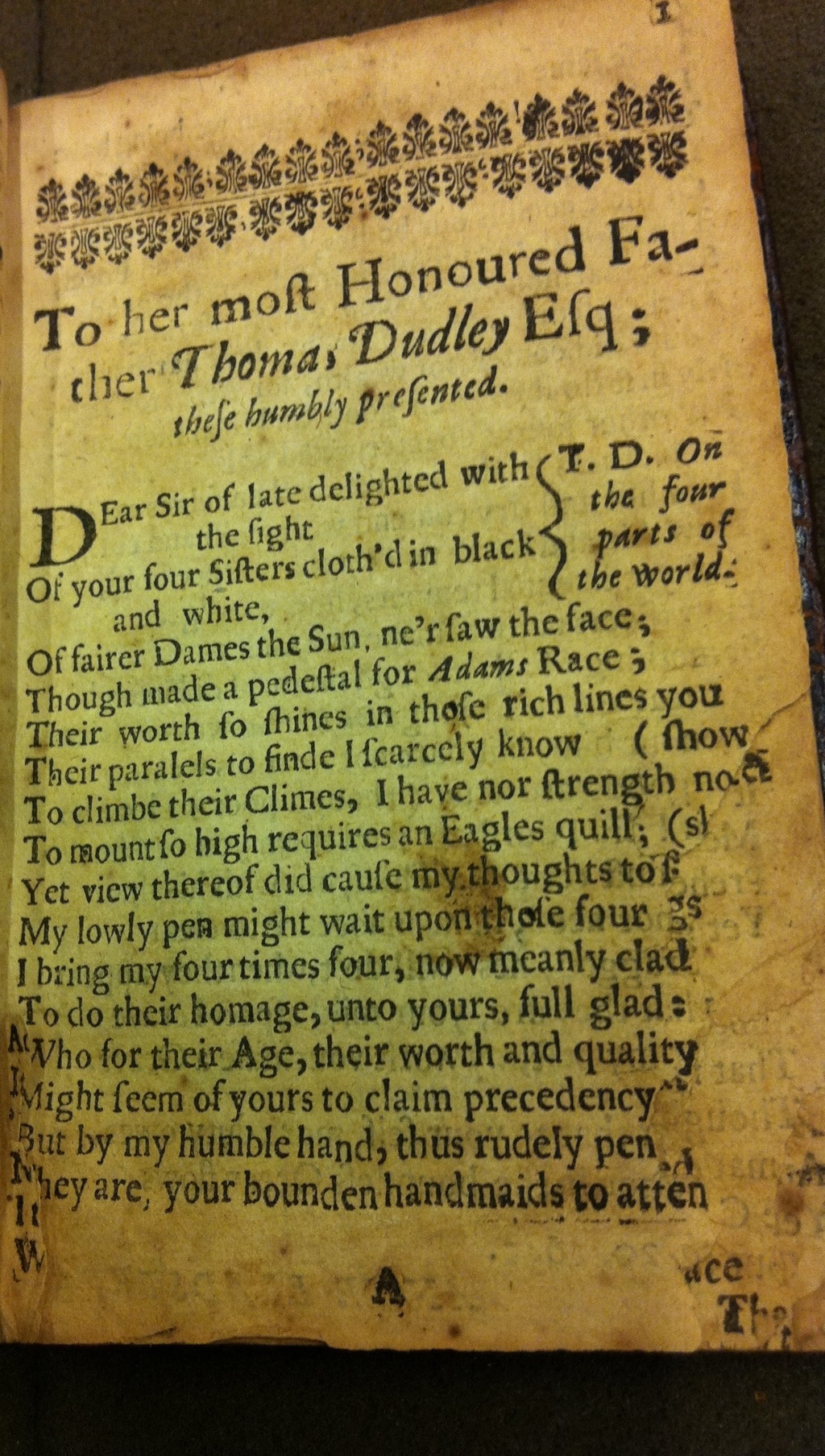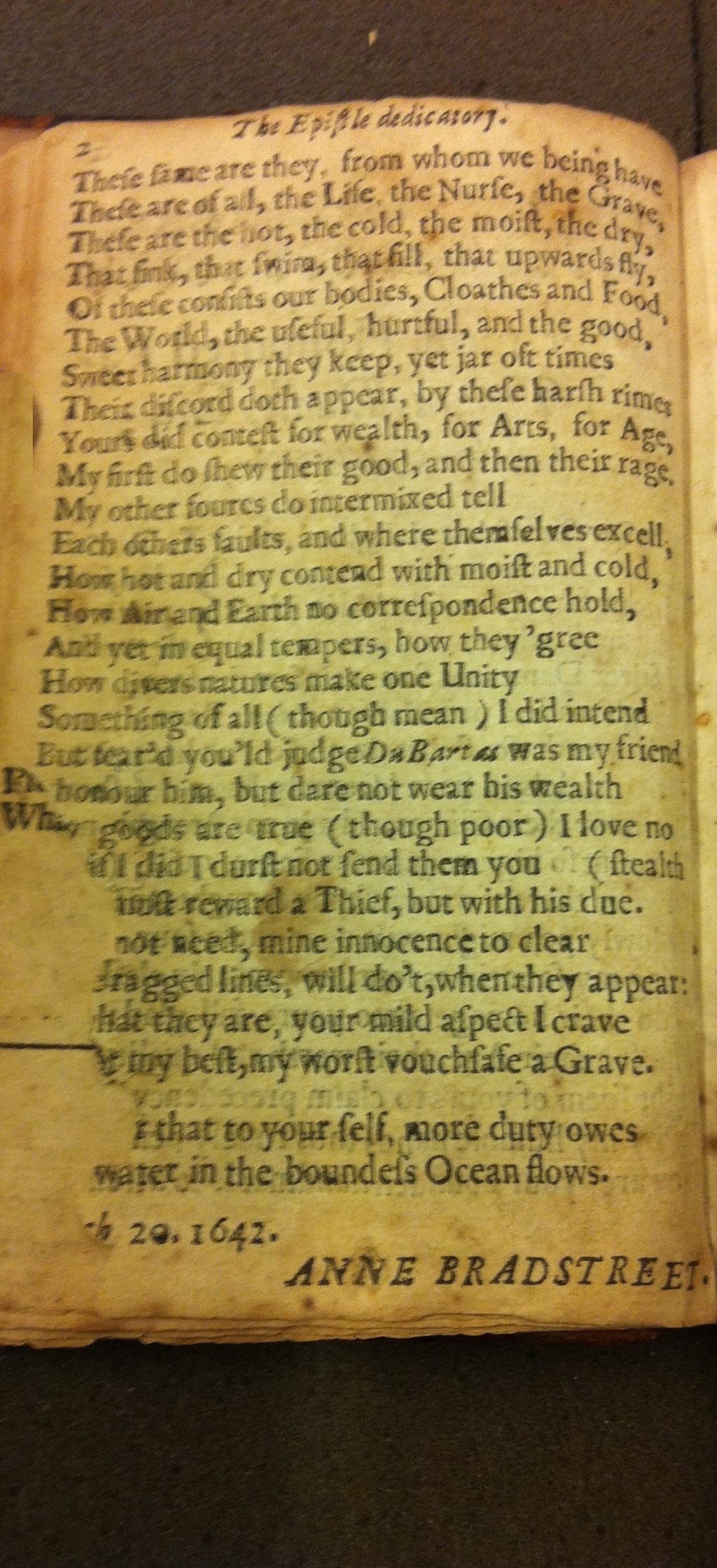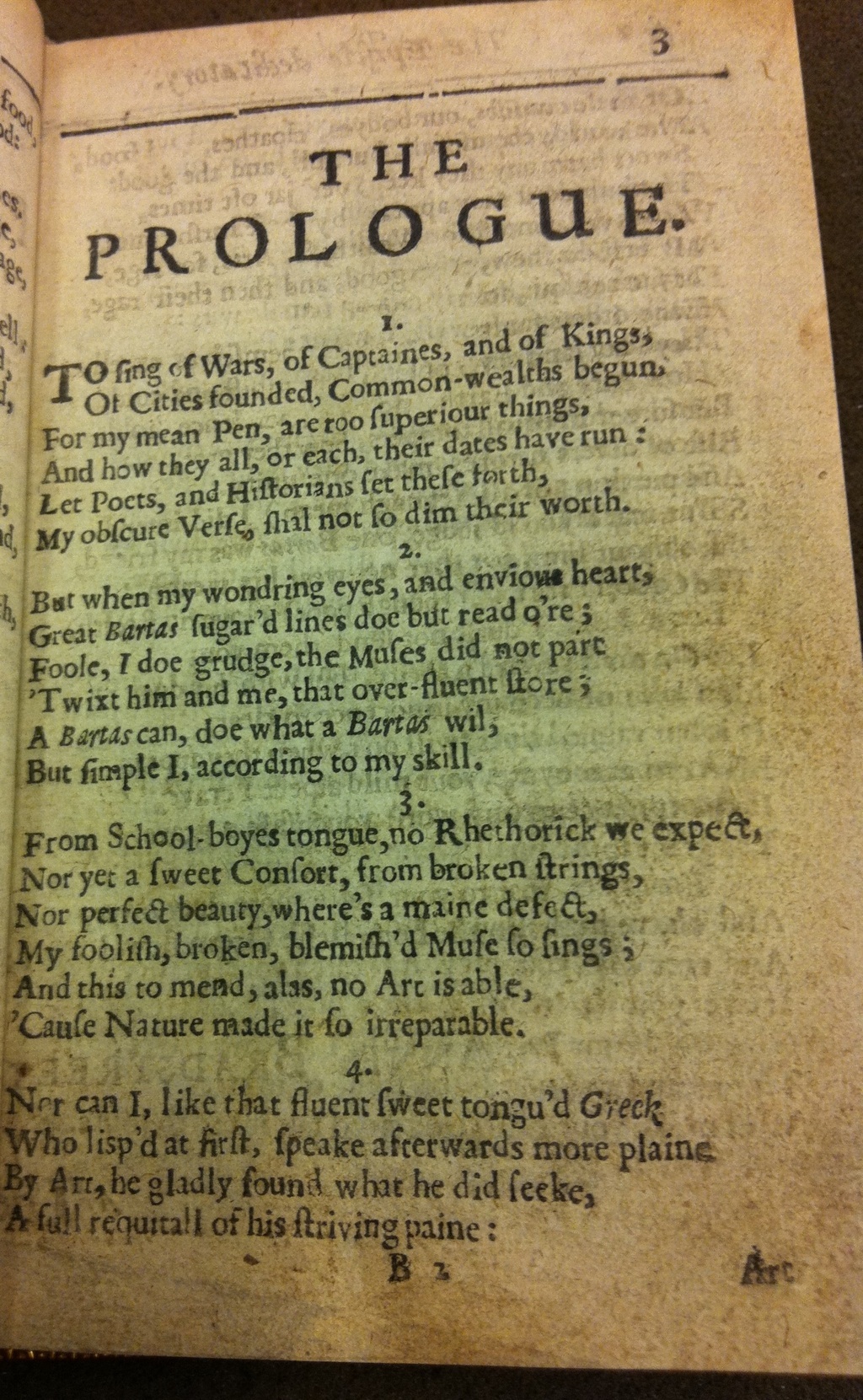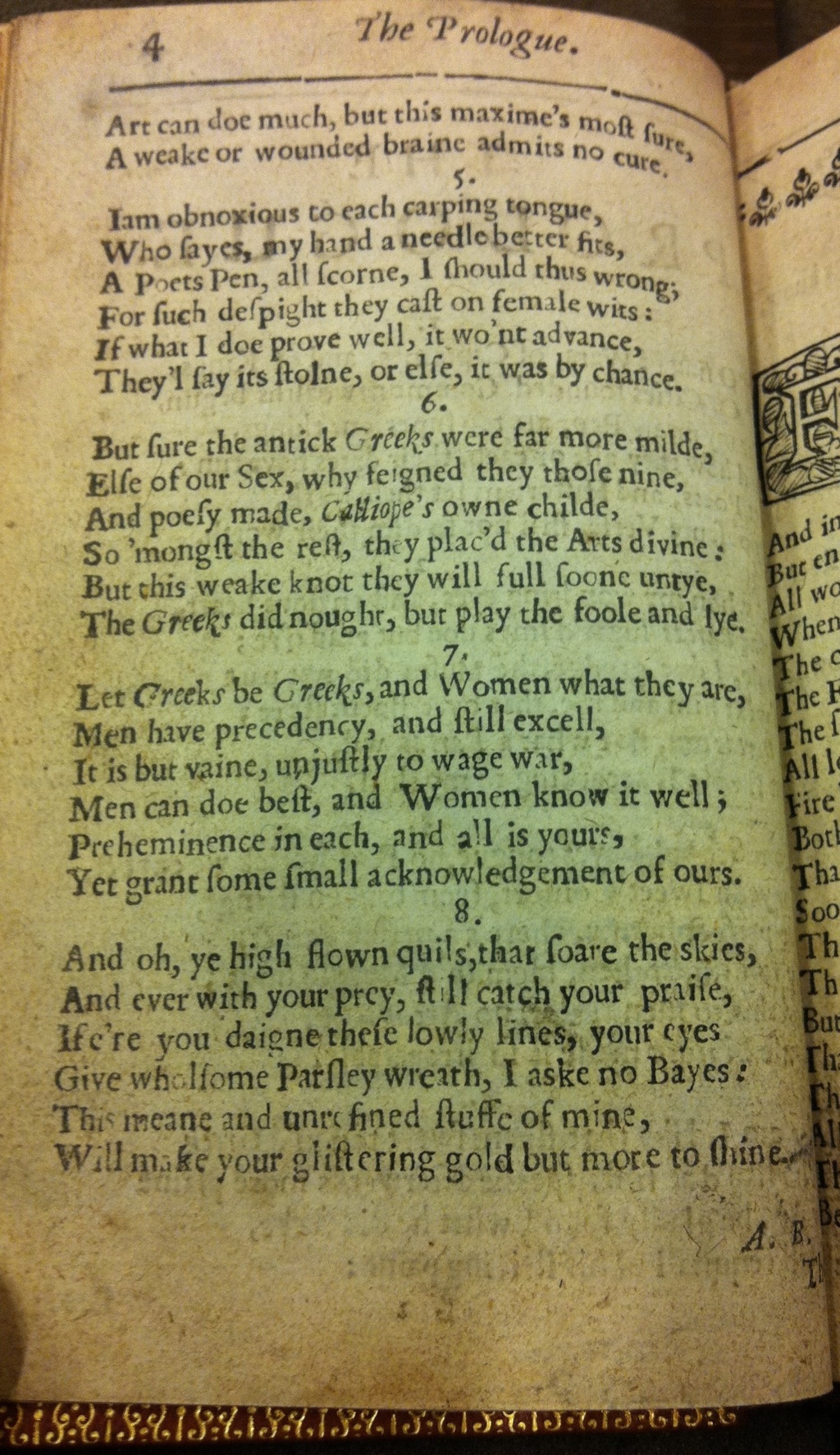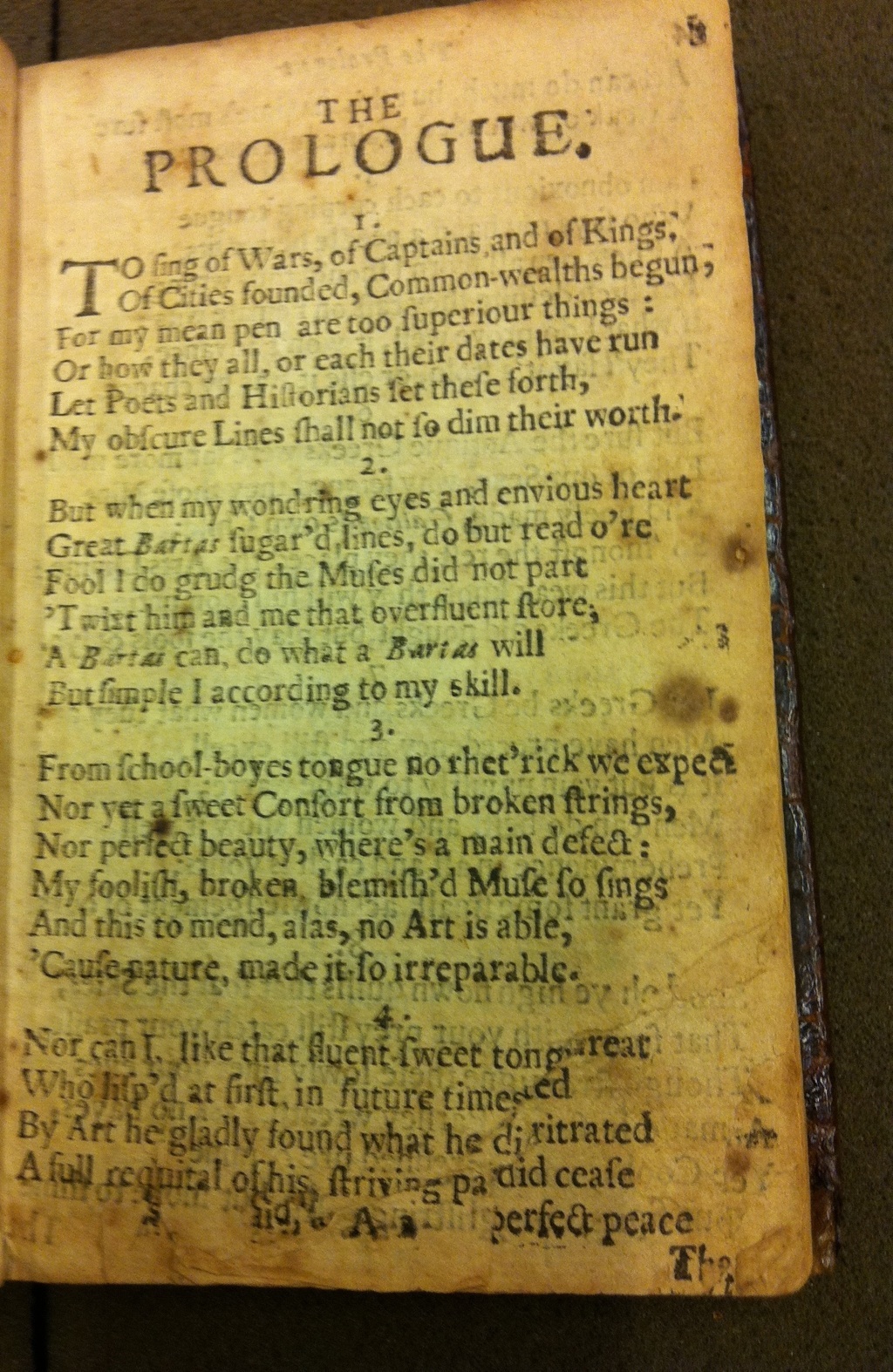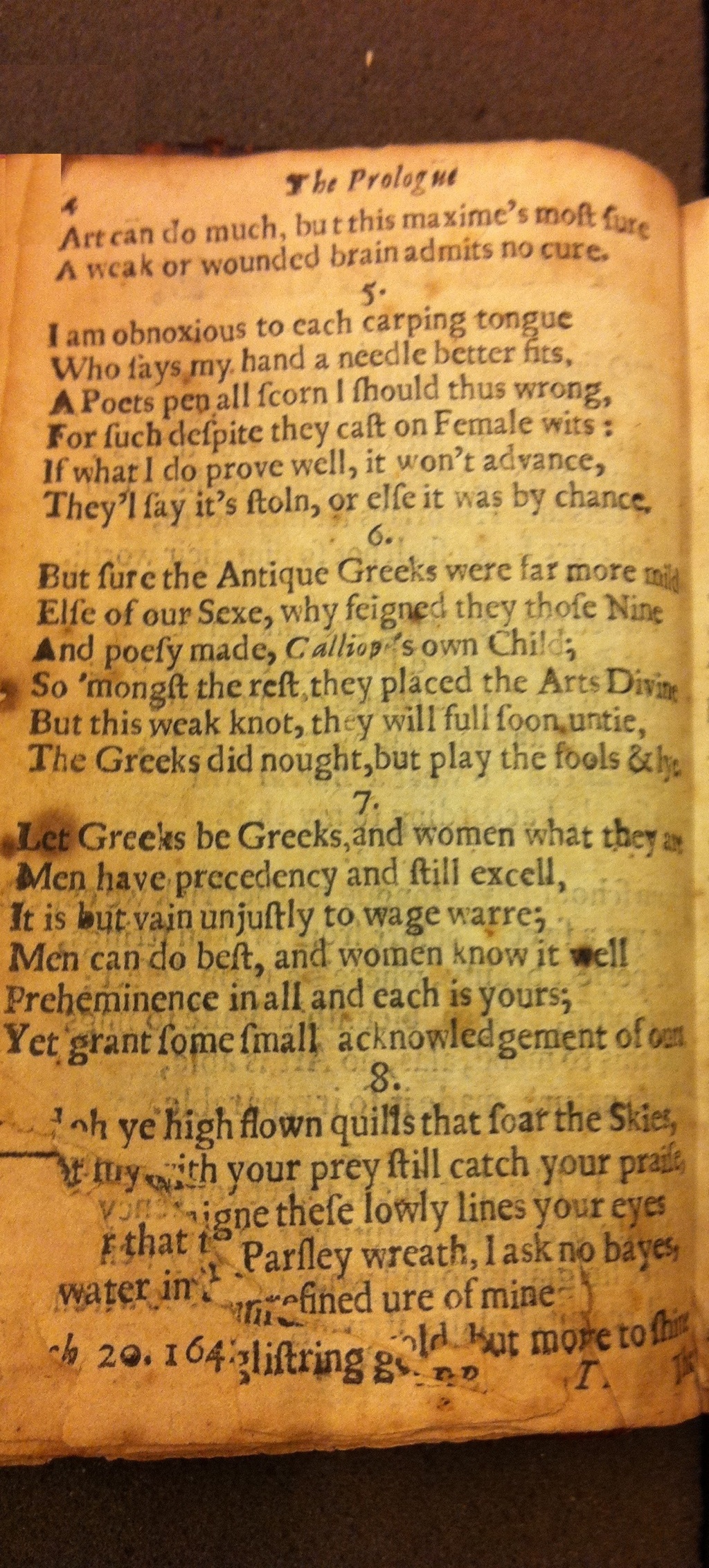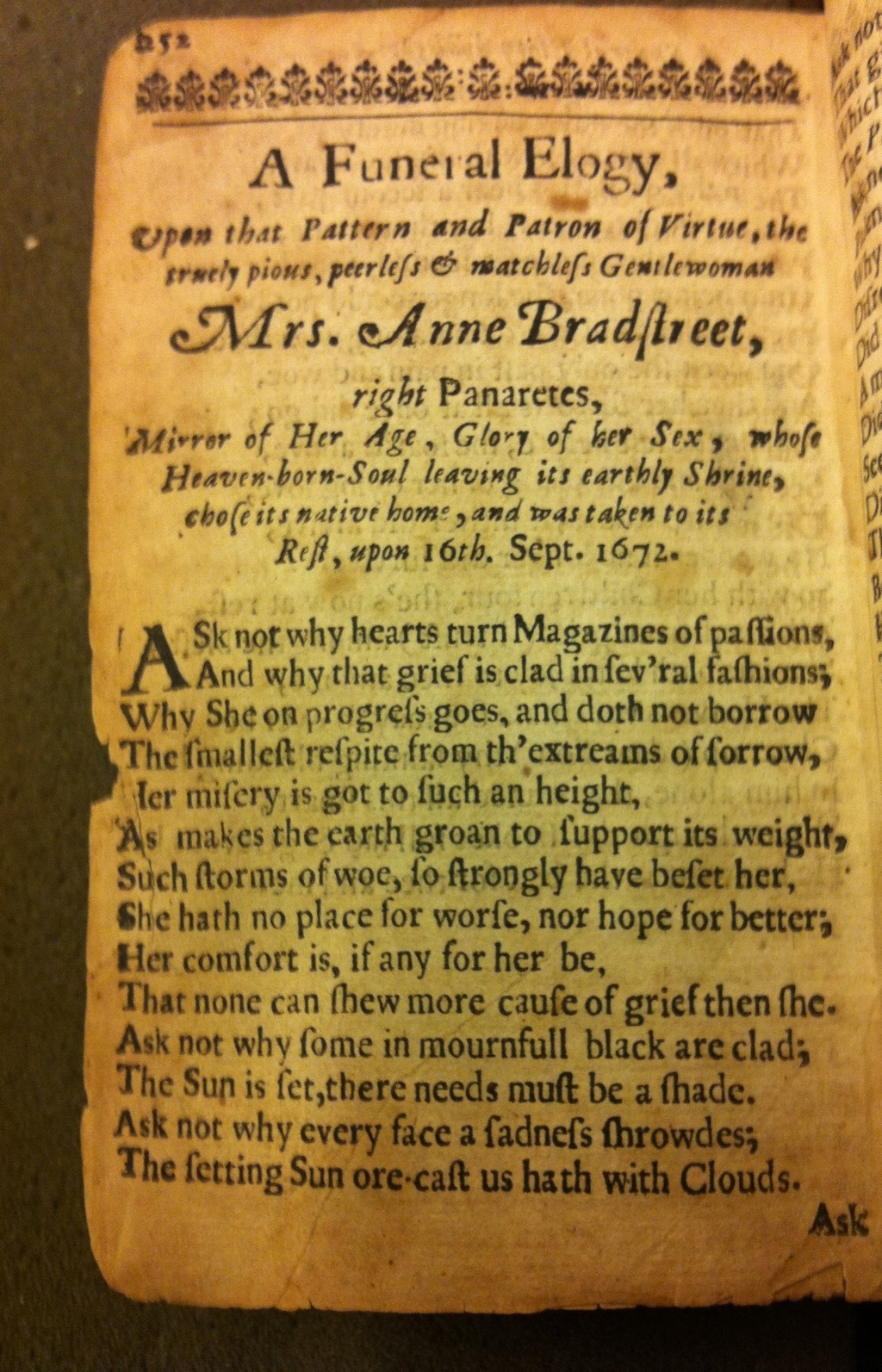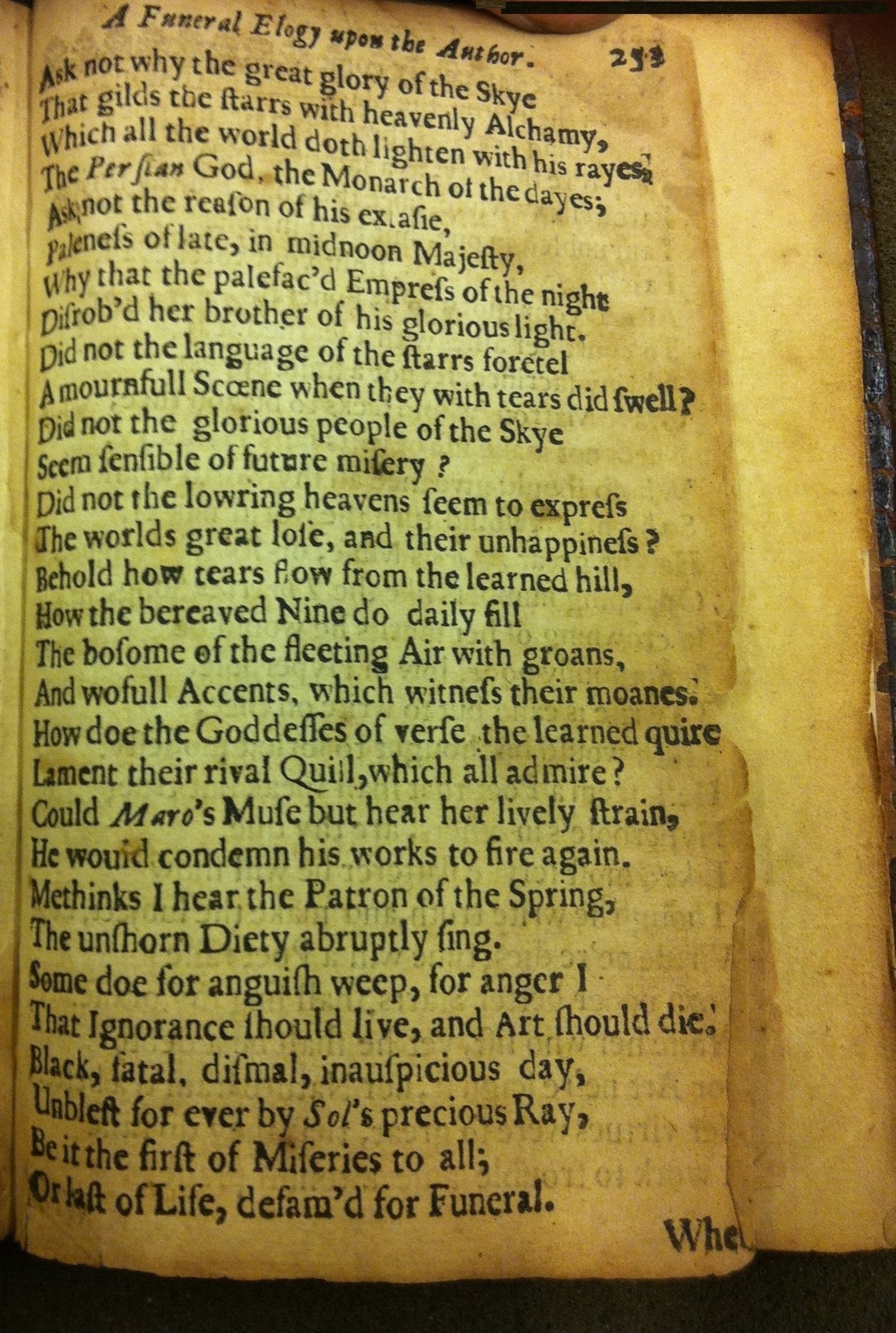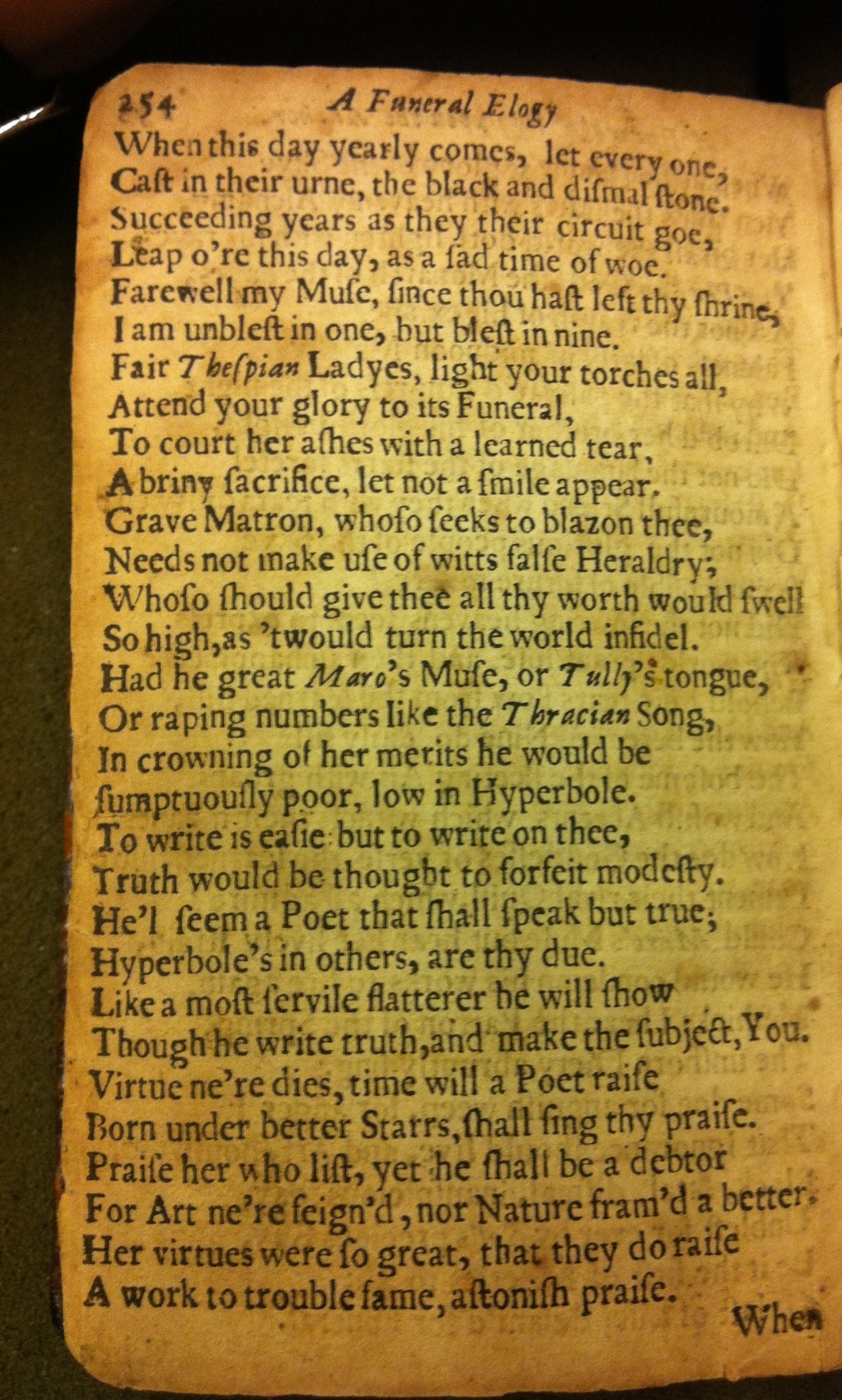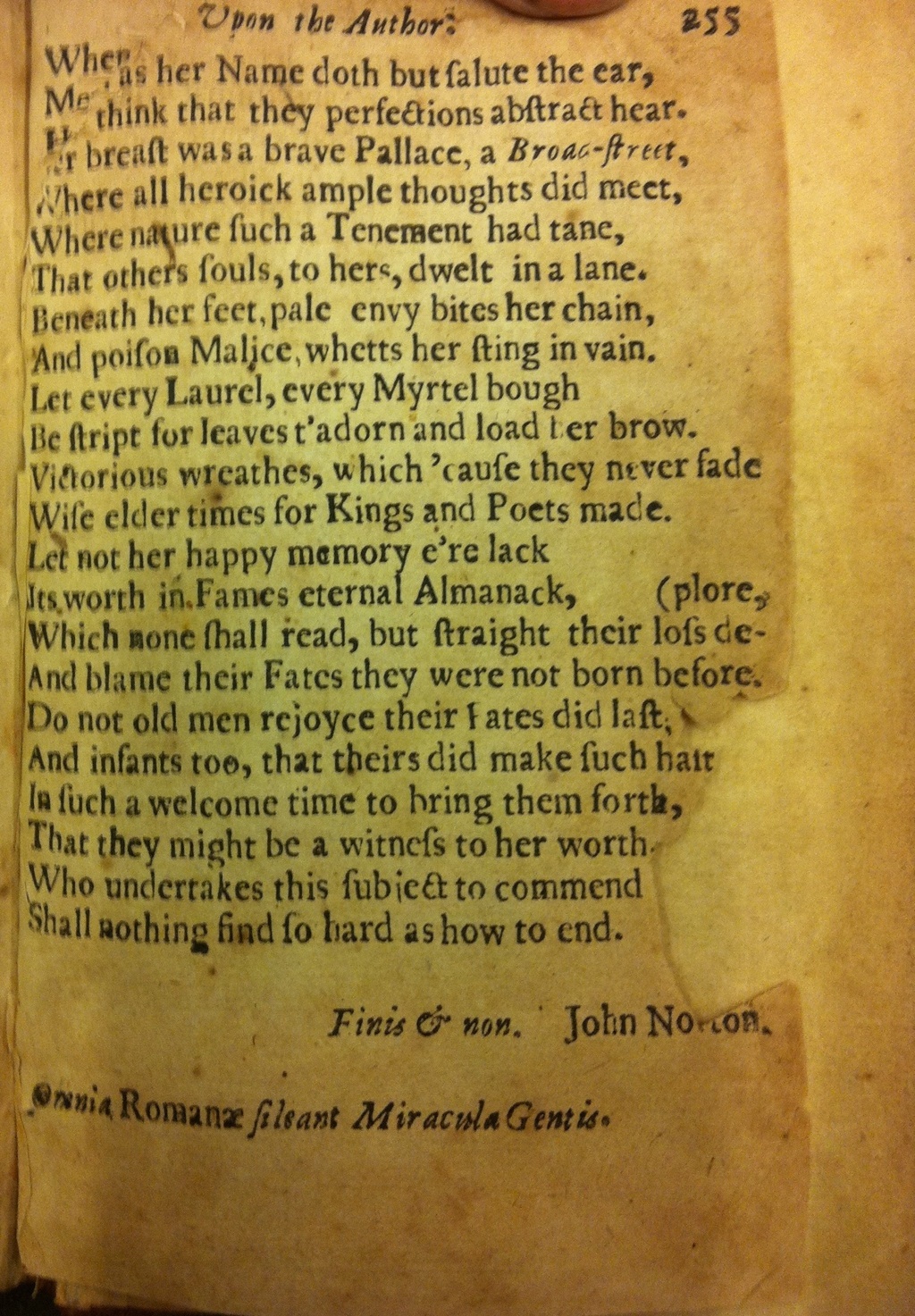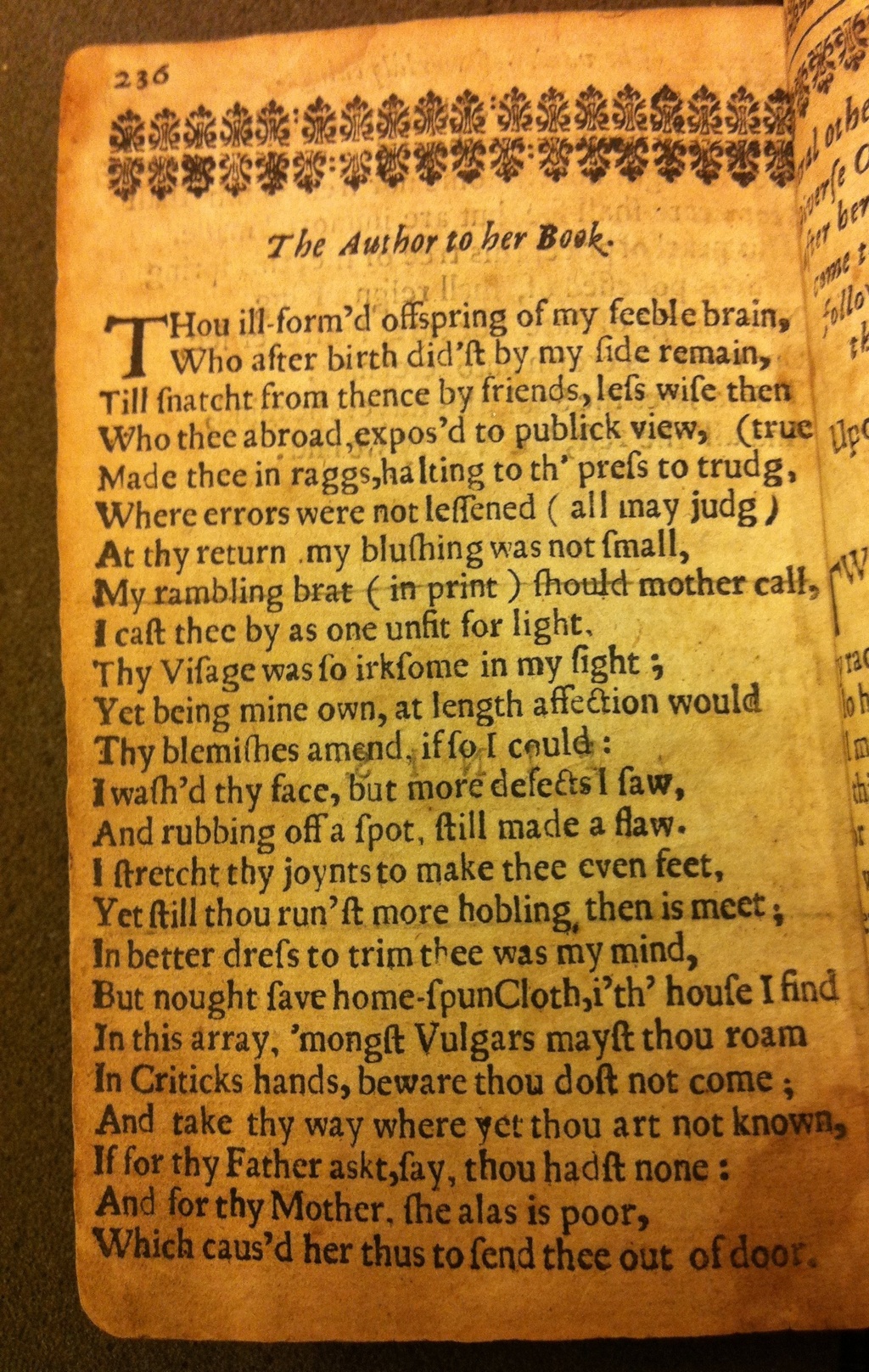| Tenth Muse | Several Poems |
|---|
|
Frontispiece - The Tenth Muse |
Frontispiece - Several Poems |
|
THE TENTH MUSE Lately sprung up in AMERICA. OR Severall Poems, compiled with great variety of VVit and Learning, full of delight. Wherein especially is contained a com- pleat discourse and description of
The Four Together with an Exact Epitomie2 of the Four Monarchies, viz.
The Also a Dialogue between Old England and New, concerning the late troubles. With divers other pleasant and serious Poems.
By a Gentlewoman in those parts.
Printed at London for Stephen Bowtell at the signe of the Bible in Popes Head Alley. 1650. |
SEVERAL POEMS Compiled with great variety of Wit and Learning, full of Delight; Wherein especially is contained a compleat Discourse, and Description of
The Four Together with an exact Epitome2 of the three first Monarchyes
Viz. The And beginning of the Romane Common-wealth to the end of their last King: With diverse other pleasant and serious Poems,
By a Gentlewoman in New England.
The second Edition, Corrected by the Author’ and enlarged by an Addition of several other Poems found amongst her Papers after her Death.
Boston, Printed by John Foster, 1678. |
|
Kind Reader |
Kind Reader [John Woodbridge] |
|
Kind Reader:4 Had I opportunity but to borrow some of the Authors wit, ‘tis pos- sible I might so trim this curious work with such quaint expressions, as that the Preface might bespeak thy further peru- sall; but I feare ‘twil be a shame for a man that can speak so little; to be seene in the title page of this Womans Book, lest by comparing the one with the other, the Reader should passe his sentence, that it is the gift of wo- men, not only to speak most, but to speake best; I shall leave therefore to commend that, which with any ingenious Reader will too much commend the Author, unlesse men turne more peevish then women, to envie the excellency of the inferiour Sex. I doubt not but the Reader will quickly finde more then I can say, and the worst effect of his rea- ding will be unbeleif, which will make him question whether it be a womans Work, and aske, Is it possible? If any doe, take this as an answer from him that dares avow it; It is the VVork of a VVoman, honoured, and e- steemed where she lives, for her gracious de- meanour, her eminent parts, her pious con- versation, her courteous disposition, her exact diligence in her place, and discreet mannag- ing of her family occasions;5 and more then so, these Poems are the fruit but of some few houres, curtailed from her sleep, and other re- freshments. I dare adde little, lest I keepe thee too long, if thou wilt not beleeve the worth of these things (in their kind) when a man sayes it, yet beleeve it from a woman when thou seest it. This only I shall annex, I feare the displeasure of no person in the pub- lishing of these Poems but the Authors6, without whose knowledge, and contrary to her expe- ctation I have presumed to bring to publick view what she resolved should never in such a manner see the Sun;7 but I found that di- vers had gotten some scattered papers, affe- cted them wel, were likely to have sent forth broken peices to the Authors prejudice, which I thought to prevent, as well as to pleasure those that earnestly desired the view of the whole. |
Kind Reader:4 Had I opportunity but to borrow some of the Authors wit, ‘tis possible I might so trim this curious work with such quaint expressions, as that the Preface might bespeak thy further Perusal; but I fear ‘twill be a shame for a Man that can speak so little, To be seen in the title-page of this Womans Book, lest by comparing the one with the other, the Rea- der should pass his sentence that it is the gift of wo- men not only to speak most but to speak best; I shal leave therefore to commend that, which with any ingenious Reader will too much commend the Au- thor, unless men turn more peevish then women, to envy the excellency of the inferiour Sex. I doubt not but the Reader will quickly find more then I can say, and the worst effect of his reading will be unbelief, which will make him question whether it be a womans work, and aske, Is is possible? If any do, take this as an answer from him that dares avow it; It is the Work of a Woman, honoured, and esteemed where she lives, for her gracious de- meanour, her eminent parts, her pious conversa- tion, her courteous disposition, her exact diligence in her place, and discreet managing of her Family occasions,5 and more then so, these Poems are the fruit but of some few houres, curtailed from her sleep and other refreshments. I dare adde little lest I keep thee too long; if thou wilt not believe the worth of these things (in their kind) when a man sayes it, yet believe it from a woman when thou seest it. This only I shall annex, I fear the dis- pleasure of no person in the publishing of these Poems but the Author6 , without whose knowledg, and contrary to her expectation, I have presumed to bring to publick view, what she resolved in such a manner should never see the Sun;7 but I found that diverse had gotten some scattered Pa- pers, affected them well, were likely to have sent forth broken pieces, to the Authors prejudice, which I thought to prevent, as well as to pleasure those that earnestly desired the view of the whole. |
|
"Mercury shew'd Apollo, Bartas book" N. Ward |
"Mercury shew'd Apollo, Bartas book" N.Ward |
|
Mercury shew’d Apollo, Bartas8 Book, Minerva this, and wisht him well to look, And tell uprightly, which, did which excell; He view’d, and view’d, and vow’d he could not tell. They bid him Hemisphear9 his mouldy nose, With’s crackt leering-glasses, for it would pose The best brains he had in’s old pudding-pan, Sex weigh’d, which best, the Woman, or the Man? He peer’d, and por’d, and glar’d, and said for wore, I’me even as wise now, as I was before: They both ‘gan10 laugh, and said, it was no mar’l11 The Auth’resse was a right Du Bartas Girle. Good sooth12 quoth the old Don,13 tel ye me so, I muse whither at length these Girls wil go; It half revives my chil frost-bitten blood, To see a woman, once, do ought that’s good; And chode buy14 Chaucers Boots, and Homers Furrs, Let men look to’t, least women weare the Spurs. N. Ward15 |
Mercury shew’d Apollo, Bartas8 Book, Minerva this, and wisht him well to look, And tell uprightly, which did which excell, He view’d, and view’d, and vow d he could not tel. They bid him Hemisphear9 his mouldy nose, With’s crackt leering glasses, for it would pose The best brains he had in’s old pudding-pan, Sex weigh’d, which best, the Woman, or the Man? He peer’d, and por’d, & glar’d, & said for wore, I’me even as wise now, as I was before: They both ‘gan10 laugh, and said, it was no mar’l11 The Auth’ress was a right Du Bartas Girle. Good sooth11 quoth the old Don,12 tell ye me so, I muse whither at length these Girls will go; It half revives my chil frost-bitten blood, To see a Woman once, do ought that’s good; And chode by14 Chaucers Boots, and Homers Furrs, Let Men look to’t, least women weare the Spurrs. N. Ward15 |
|
To my deare Sister, the Author of these Poems. [John Woodbridge] |
To my deare Sister, the Author of these Poems. I.W. [John Woodbridge] |
|
To my deare Sister, the Author of these Poems.
Though most that know me dare (I think) affirm I ne’re was borne to doe a Poet harm, Yet when I read your pleasant witty strains, It wrought so strongly on my addle16 braines; That though my verse be not so finely spun, And so (like yours) cannot so neatly run, Yet am I willing, with upright intent, To shew my love without a complement. There needs no painting to that comely face, That in its native beauty hath such grace; Whit17 I (poore silly I) prefix therefore, Can but doe this, make yours admir’d the more; And if but only this, I doe attaine Content, that my disgrace may be your gaine. If women, I with women, may compare, Your Works are solid, others weake as aire; Some books of Women I have heard of late, Perused some, so witlesse, intricate, So void of sense, and truth, as if to erre Were only wisht (acting above their sphear) And all to get, what (silly soules) they lack, Esteeme to be the wisest of the pack; Though (for your sake) to some this be permitted, To print, yet wish I many better witted; Their vanity make this to be inquired, If women are with wit, and sence inspired: Yet when your Works shall come to publick view, ‘Twill be affirm’d, ‘twill be confirm’d by you: And I, when seriously I had revolved What you had done, I presently resolved, Theirs was the Persons, not the Sexes failing, And therefore did be-speak a modest vailing.18 You have acutely19 in Eliza’s ditty20 Acquitted women, else I might with pitty, Have wisht them all to womens Works to look, And never more to meddle with their book. What you have done, the Sun shall witnesse beare, That for a womans Worke ‘tis very rare; And if the Nine21 vouchsafe the Tenth a place, I think they rightly may yeeld you that grace. But least22 I should exceed, and too much love, Should too too much endear’d affect on23 move, To super-adde in praises I shall cease, Least while I please my selfe I should displease The longing Reader, who may chance complaine, And so requite my love with deep disdaine; That I your silly Servant, stand i’ th’ porch, Lighting your Sun-light with my blinking torch; Hindring his minds content, his sweet repose, Which your delightfull Poems doe disclose, When once the Caskets op’ned; yet to you Let this be added, then i’le bid adieu. If you shall think, it will be to your shame To be in print, then I must beare the blame: If’t be a fault, ‘tis mine, ‘tis shame that might Deny so faire an infant of its right, To looke abroad; I know your modest minde, How you will blush, complaine, ‘tis too unkinde, To force a womans birth, provoke her paine, Expose her Labours to the world’s disdaine: I know you’l say, you doe defie that mint, That stampt you thus, to be a foole in print. ‘Tis true, it doth not now so neatly stand, As ift ‘twere pollisht with your owne sweet hand; ‘Tis not so richly deckt, so trimly tir’d,24 Yet it is such as justly is admir’d. If it be folly, ‘tis of both, or neither, Both you and I, we’l both be fools together; And he that sayes, ‘tis foolish (if my word May sway) by my consent shall make the third. I dare out-face the worlds disdaine for both, If you alone professe you are not wroth; Yet if you are, a womans wrath is little, When thousands else admire you in each tittle.25 I.W.26 |
To my deare Sister, the Author of these Poems.
Though most that know me, dare (I think) affirm I ne’re was born to do a Poet harm, Yet when I read your pleasant witty strains, It wrought so strongly on my addle16 brains; That though my verse be not so finely spun, And so (like yours) cannot so neatly run, Yet am I willing, with upright intent, To shew my love without a complement. There needs no painting to that comely face, That in its native beauty hath such grace; What17 I (poore silly I) prefix therefore, Can but do this, make yours admir’d the more; And if but only this, I do attain Content, that my disgrace may be your gain. If women, I with women, may compare, Your works are solid, others weak as Air; Some Books of Women I have heard of late, Perused some, so witless, intricate, So void of sense, and truth, as if to erre Were only wisht (acting above their sphear) And all to get, what (silly Souls) they lack, Esteem to be the wisest of the pack; Though (for your sake) to some this be permitted, To print, yet wish I many better witted; Their vanity make this to be enquired, If Women are with wit, and sence inspired: Yet when your Works shall come to publick view, ‘Twill be affirm’d, ‘twill be confirm’d by you: And I, when seriously I had revolved What you had done I presently resolved, Theirs was the Persons, not the Sexes failing, And therefore did be-speak a modest vailing.18 You have acutely20 in Eliza’s ditty,20 Acquitted women, else I might with pitty, Have wisht them all to womens Works to look, And never more to meddle with their book. What you have done, the Sun shall witness bear, That for a womans Work ‘tis very rare; And if the Nine,21 vouchsafe the Tenth a place, I think they rightly may yield you that grace. But least22 I should exceed, and too much love, Should too too much endear’d affection23 move, To super-adde in praises I shall cease, Least while I please my selfe I should displease The longing Reader, who may chance complain, And so requite my love with deep disdain; That I your silly Servant, stand i’ th’ Porch, Lighting your Sun-light, with my blinking Torch; Hindring his minds content, his sweet repose, Which your delightful Poems doe disclose, When once the Caskets op’ned, yet to you Let this be added, then I’le bid adieu, If you shall think, it will be to your shame To be in print, then I must bear the blame: If’t be a fault, ‘tis mine, ‘tis shame that might Deny so faire an Infant of its right, To look abroad; I know your modest mind, How you will blush, complain, ‘tis too unkind: To force a womans birth, provoke her paine, Expose her labours to the Worlds disdaine. I know you l say, you do defie that mint, That stampt you thus, to be a foole in print. ‘Tis true, it doth not now so neatly stand, As if ‘twere pollisht with your own sweet hand; ‘Tis not so richly deckt, so trimly tir’d,24 Yet it is such as justly is admir’d. If it be folly, ‘tis of both, or neither, Both you and I, we’l both be fools together; And he that sayes, ‘tis foolish, (if my word May sway) by my consent shall make the third, I dare out-face the worlds disdain for both, If you alone profess you are not wroth; Yet if you are, a Womans wrath is little, When thousands else admire you in each tittle.25
I.W.26 |
|
Upon the Author, by a knowne Friend/I cannot wonder at Apollo now C.B. |
Upon the Author; by a known Friend./ I cannot wonder at Apollo now B.W., C.B |
|
Upon the Author, by a knowne Friende.27
Now I beleeve Tradition, which doth call The Muses, Vertues, Graces, Females all; Only they are not nine, eleaven, nor three, Our Authresse proves them but one unity. Mankind take up some blushes on the score, Menopolize perfection no more: In your owne Arts, confesse your selves out-done, The Moone hath totally ecclips’d the Sun, Not with her sable mantle mufling him, But her bright silver makes his gold looke dim: Just as his beams force our pale Lamps to winke, And earthly Fires within their ashes shrinke.
I cannot wonder at Apollo now, That he with Female Lawrell crown’d his brow, That made him witty: had I leave to chuse, My Verse should be a Page unto your Muse.
C.B.28 |
Upon the Author; by a known Friend.
Now I believe Tradition, which doth call The Muses, Virtues, Graces, Females all; Only they are not nine, eleven nor three; Our Auth’ress proves them but one unity. Mankind take up some blushes on the score; Monopolize perfection no more; In your own Arts, confess your selves out-done, The Moon hath totally eclips’d the Sun, Not with her sable Mantle muffling him; But her bright silver makes his gold look dim: Just as his beams force our pale lamps to wink, And earthly Fires, within their ashes shrink. B.W.27
I cannot wonder at Apollo now, That he with Female Laurel crown’d his brow, That made him witty: had I leave to chose, My Verse should be a page unto your Muse C.B.28 |
|
Arme, arme Soldado's arme, Horse R. |
no page |
|
no page |
|
|
Arme, arme, Soldado’s29 arme, Horse, Horse, speed to your Horses, Gentle-women, make head, they vent their plots in Verses; They write of Monarchies, a most seditious word, It signifies Oppression, Tyranny, and Sword: March amain30 to London, they’l rise, for there they flock, But stay a while, they seldome rise til ten a clock. R.Q.31 |
no page |
|
In praise of the Author/What Golden splendid STAR is this, so bright" N.H |
In praise of the Author, Mistres Anne Bradstreet/What golden splendid STAR is this, so bright" N.H. |
|
In praise of the Author, Mistris Anne Bradstreet, Vertue’s true and lively Patterne, Wife of the Worshipfull Simon Brad- street Esquire.29
At present residing in the Occi- dentall parts of the World, in America, alias
N O V – A N G L I A.
What Golden splendent30 STAR is this, so bright, One thousand miles thrice told, both day and night, (From th’ Orient first sprung) now from the West That shines; swift-winged Phoebus, and the rest, Of all Joves fiery flames surmounting far, As doth each Planet, every falling Star; By whose divine, and lucid light most cleare, Natures darke secret Mysteries appeare; Heaven’s, Earths, admired wonders, noble acts Of Kings, and Princes most heroyick31 facts, And what e’re else in darkness seem’d to dye,32 Revives all things so obvious now to th’eye; That he who these, its glittering Rayes views o’re, Shall see what’s done, in all the world before.
N.H.33 |
In praise of the Author, Mistris Anne Bradstreet, Virtues true and lively Pattern, Wife of the Worshipfull Simon Bradstreet Esq;32
At present residing in the Occidental parts of the World in America, Alias N O V – A N G L I A.
What Golden splendent33 STAR is this so bright, One thousand Miles thrice told, both day and night, (From th’ Orient first sprung) now from the West That shines; swift-winged Phoebus, and the rest Of all Jove’s fiery flames surmounting far As doth each Planet, every falling Star; By whose divine, and lucid light most clear Natures dark secret mysteryes appear; Heavens, Earths, admired wonders, noble acts Of Kings and Princes most heroick34 facts, And what e’re else in darkness seem’d to dye, 35 Revives all things so obvious now to th’eye, That he who these its glittering rayes views o’re, Shall see what’s done, in all the world before. N.H.36 |
|
Upon the Author./Another to Mris Anne Bradstreet, Author of this Poem./An anagram./Another. C.B., H.S. |
Upon the Author/Another to Mrs Anne Bradstreet, author of this Poem./An Anagram/Another. C.B., H.S. |
|
Upon the Author
Twere extreame folly should I dare attempt, To praise this Authors worth with complement; None but her self must dare commend her parts, Whose sublime brain’s the Synopsis of Arts: Nature and Skil, here both in one agree, To frame this Master-peice of Poetry: False Fame, belye their Sex, no more, it can, Surpasse, or parallel, the best of man. C.B.34
Another to Mris. Anne Bradstreet, Author of this Poem.
I’ve read your Poem (Lady) and admire, Your Sex, to such a pitch should e’re aspire; Goe on to write, continue to relate, New Histories, of Monarchy and State: And what the Romans to their Poets gave, Be sure such honour, and esteeme you’l have. H.S.35
So Bartas like thy fine spun Poems been, That Bartas name will prove an Epicene.38
Another.
Anne Bradstreate.
Artes bred neat An. |
Upon the Author.
‘Twere extream folly should I dare attempt, To praise this Authors worth with complement; None but her self must dare commend her parts, Whose sublime brain’s the Synopsis of Arts. Nature and skill, here both in one agree, To frame this Master-piece of Poetry: False Fame, belye their Sex no more, it can Surpass, or parallel, the best of man. C.B.37
Another to Mrs. Anne Bradstreet, Author of this Poem.
I’ve read your Poem (Lady) and admire, Your Sex to such a pitch should e’re aspire; Go on to write, continue to relate, New Historyes, of Monarchy and State: And what the Romans to their Poets gave, Be sure such honour, and esteem you’l have. H.S.38
An Anagram.39
Anna Bradestreate Deer neat An Bartas.40
So Bartas like thy fine spun Poems been, That Bartas name will prove an Epicene.41
Another.
Anne Bradstreate Artes bred neat An. |
|
no page |
Upon Mrs Anne Bradstreet, Her Poems, &c. J.Rogers |
|
no page |
|
|
UPON Mrs. Anne Bradstreet Her Poems, c. MADAM, twice through the Muses Grove I walkt, Under your blissfull bowres, I shrowding42 there, It seem’d with Nymphs of Helicon43 I talkt. For there those sweet-lip’d Sifters44 sporting were, Apollo with his sacred Lute sate by, On high they made their heavenly Sonnets flye, Posies around they strow’d,45 of sweetest Poesie.
2 Twice have I drunk the Nectar of your lines, Which high sublim’d my mean born phantasie. Flusht with these streams of your Maronean wines46 Above my self rapt to an extasie: Methought I was upon mount Hiblas47 top, There where I might those fragrant flowers lop, Whence did sweet odors flow, and honey spangles48 drop.
3 To Venus shrine no Altars raised are, Nor venom’d shafts from painted quiver fly, Nor wanton Doves of Aphrodites Carr,49 Of50 fluttering there, nor here forlornly lie, Lorne51 Paramours52, not chatting birds tell news How sage Apollo, Daphne hot pursues, Or stately Jove himself is wont to haunt the stews.53
4 Nor barking Satyrs breath, nor driery clouds Exhal’d from Styx, their dismal drops distil Within these Fairy, flowry fields, nor shrouds The screeching night Raven, with his shady quill: But Lyrick strings here Orpheus nimbly hitts, Arion on his sadled Dolphin sits,54 Chanting as every humour, age & season fits.
5 Here silver swans, with Nightingales set spells, Which sweetly charm the Traveller, and raise Earths earthed Monarchs, from their hidden Cells; And to appearance summons lapsed dayes, There heav’nly air, becalms the swelling frayes,55 And fury fell of Elements allayes, By paying every one due tribute of his praise.
6 This seem’d the Scite56 of all those verdant vales, And purled springs, whereat the Nymphs do play, With lofty hills, where Poets rear their tales, To heavenly vaults, which heav’nly sound repay By ecchoes sweet rebound, here Ladyes kiss, Circling nor songs, nor dances circle miss; But whilst those Syrens sung, I sunk in sea of bliss.
7 Thus weltring57 in delight, my virgin mind Admits a rape; truth still lyes undiscri’d, Its singular, that plural seem’d, I find, ‘Twas58 Fancies glass59 alone that multipli’d; Nature with Art, so closely did combine, I thought I saw the Muses trebble trine,60 Which prov’d your lonely Muse, superiour to the nine.
8 Your only hand those Poesies did compose, Your head the source, whence all those springs did flow, Your voice, whence changes sweetest notes arose, Your feet that kept the dance alone, I trow:61 Then vail your bonnets, Poetasters62 all, Strike, lower amain,63 and at these humbly fall, And deem your selves advanc’d to be her Pedestal.
9 Should all with lowly Congies Laurels64 bring, Waste Flora’s26 Magazine66 to find a wreathe; Or Pineus Banks ‘twere too mean offering, Your Muse a fairer Garland doth bequeath To guard your fairer front; here ‘tis your name Shall stand immarbled; this your little frame Shall great Colossus be, to your eternal fame.
I’le please my self, though I my self disgrace, What errors here be found, are in Errataes place.
J. Rogers.67 |
|
To her most Honoured Father Thomas Dudley Esq. These humbly presented. Anne Bradstreet |
To her most Honoured Father Thomas Dudley Esq; these humbly presented. Anne Bradstreet March 20.1642 |
|
Deare Sir, of late delighted with the sight, Of your* four sisters, deckt in black & white Of fairer Dames, the sun near40 saw the face, (though made a pedestal for Adams Race) Their worth so shines, in those rich lines you show. Their paralells to find I scarcely know, To climbe their Climes, I have nor strength, nor skill, To mount so high, requires an Eagles quill: Yet view thereof, did cause my thoughts to soare, My lowly pen, might wait upon those four, I bring my four; and four,42 now meanly clad, To do their homage unto yours most glad, Who for their age, their worth, and quality, Might seem of yours to claime precedency; But by my humble hand thus rudely pen’d They are your bounden handmaids to attend. These same are they, of whom we being have, These are of all, the life, the nurse, the grave, These are, the hot, the cold, the moist, the dry, That sinke, that swim, that fill, that upwards flye, Of these consists, our bodyes, cloathes, and food, The world, the usefull, hurtfull, and the good: Sweet harmony they keep, yet jar oft times, Their discord may appear, by these harsh rimes. Yours did contest, for Wealth, for Arts, for Age, My first do shew, their good, and then their rage, My other four, do intermixed tell Each others faults, and where themselves excell. How hot, and dry, contend with moist, and cold, How Aire, and Earth, no correspondence hold, And yet in equall tempers, how they gree, How divers natures, make one unity. Some thing of all (though mean) I did intend, But fear’d you’ld judge, one Bartas43 was my friend, I honour him, but dare not wear his wealth, My goods are true (though poor) I love no stealth, But if I did, I durst not send them you; Who must reward a theife, but with his due. I shall not need my innocence to clear, These ragged lines, will do’t, when they appear. On what they are, your mild aspect I crave, Accept my best, my worst vouchsafe a grave.
From her, that to your selfe more duty owes, Then waters, in the boundlesse Ocean flowes.44 |
To her most Honoured Fa- ther Thomas Dudley Esq;68 these humbly presented.
Deare Sir of late delighted with the sight Of your four Sisters cloth’d in black and white, Of fairer Dames the Sun, ne’r70 saw the face; Though made a pedestal for Adams Race; Their worth so shines, in those rich lines you show Their paralels to finde I scarcely know To climbe their Climes, I have nor strength, nor skill.71 To mount so high requires an Eagles quill; Yet view thereof did cause my thoughts to soare,72 My lowly pen might wait upon those four I bring my four times four,73 now meanly clad To do their homage, unto yours, full glad: Who for their Age, their worth, and quality Might seem of yours to claim precedency;74 But by my humble hand, thus rudely penned,75 They are, your bounden handmaids to attend,76 These same are they, from whom we being have These are of all, the Life, the Nurse, the Grave, These are the hot, the cold, the moist, the dry, That sink, that swim, that fill, that upwards fly, Of these consists our bodies, Cloathes, and Food, The World, the useful, hurtful, and the good, Sweet harmony they keep, yet jar oft times Their discord doth appear, by these harsh rimes Yours did contest for wealth, for Arts, for Age, My first do shew their good, and then their rage. My other foures do intermixed tell Each others faults, and where themselves excell, How hot and dry contend with moist and cold, How Air and Earth no correspondence hold, And yet in equal tempers, how they ‘gree How divers natures, make one Unity Something of all (though mean) I did intend But fear’d you’ld judge Du Bartas77 was my friend, I honour him, but dare not wear his wealth My78 goods are true (though poor) I love no stealth But if I did, I durst not send them you Who must reward a Thief, but with his due. I shall not need, mine innocence to clear These ragged lines, will do’t, when they appear: On what they are, your mild aspect I crave Accept my best, my worst vouchsafe a Grave.
From her, that to your self, more duty owes Than water in the boundesse79 Ocean flows.
March 20, 1642.
ANNE BRADSTREET. |
|
The Prologue A.B. |
The Prologue |
|
ANNE BRADSTREET
THE PROLOGUE.
1. To sing of Wars, of Captaines, and of Kings, Of Cities founded, Common-wealths begun, For my mean Pen, are too superiour things, And how they all, or each, their dates have run: Let Poets, and Historians set these forth, My obscure Verse, shal not so dim their worth. 2. But when my wondring eyes, and envious heart, Great Bartas45 sugar’d lines doe but read o’re; Foole, I doe grudge, the Muses did not part ‘Twixt him and me, that over-fluent store; A Bartas can, doe what a Bartas wil, But simple I, according to my skill. 3. From School-boyes tongue, no Rhethorick we expect, Nor yet a sweet Consort,46 from broken strings, Nor perfect beauty, where’s a maine defect, My foolish, broken, blemish’d Muse so sings; And this to mend, alas, no Art is able, ‘Cause Nature made it so irreparable. 4. Nor can I, like that fluent sweet tongu’d Greek Who lisp’d at first, speake afterwards47 more plaine By Art, he gladly found what he did seeke, A full requitall of his striving paine: Art can doe much, but this maxime’s most sure, A weake or wounded braine admits no cure. 5. I am obnoxious to each carping tongue, Who sayes, my hand a needle better fits, A Poets Pen, all scorne, I should thus wrong; For such despight48 they cast on female wits: If what I doe prove well, it wo’nt advance, They’l say its stolne, or else, it was by chance. 6. But sure the antick49 Greeks were far more milde, Else of our Sex, why feigned they those nine, And poesy made, Calliope’s owne childe, So ‘mongst the rest, they plac’d the Arts divine: But this weake knot they will full soone untye, The Greeks did nought, but play the foole50 and lye.
7. Let Greeks be Greeks, and Women what they are, Men have precedency, and still excell, It is but vaine, unjustly to wage war, Men can doe best, and Women know it well; Preheminence in each, and all is yours, Yet grant some small acknowledgement of ours. 8. And oh, ye high flown quils, that soare the skies, And ever with your prey, still catch your praise, If e’re you daigne these lowly lines, your eyes Give wholsome Parsley wreath,51 I aske no Bayes: This meane and unrefined stuffe52 of mine, Will make your glistering gold but more to shine.
A.B.53 |
THE PROLOGUE.
1. To sing of Wars, of Captains and of Kings, Of Cities founded, Common-wealths begun, For my mean pen are too superiour things: Or how they all, or each their dates have run Let Poets and Historians set these forth, My obscure Lines shall not so dim their worth. 2. But when my wondring eyes, and envious heart Great Bartas80 sugar’d lines, do but read o’re Fool I do grudg the Muses did not part ‘Twixt him and me that overfluent store; A Bartas can, do what a Bartas will But simple I according to my skill. 3. From school-boyes tongue no rhet’rick we expect, Nor yet a sweet Consort81 from broken strings, Nor perfect beauty, where’s a main defect: My foolish, broken, blemish’d Muse so sings And this to mend, alas, no Art is able; ‘Cause Nature, made it so irreparable. 4. Nor can I, like that fluent sweet tongu’d Greek82 Who lisp’d at first, in future times83 speak plain. By Art he gladly found what he did seeke, A full requital of his striving pain: Art can do much, but this maxime’s most sure A weak or wounded brain admits no cure. 5. I am obnoxious to each carping tongue Who says, my hand a needle better fits, A Poets pen all scorne I should thus wrong, For such despite84 they cast on Female wits: If what I do prove well, it won’t advance, They’l say it’s stoln, or else, it was by chance. 6. But sure the Antique85 Greeks were far more milde Else of our Sexe, why feigned they those Nine And poesy made, Calliope’s own Child; So ‘mongst the rest, they placed the Arts Divine But this weak knot, they will full soon untie, The Greeks did nought, but play the fools86 & lye. 7. Let Greeks be Greeks, and Women what they are Men have precedency, and still excell, It is but vain unjustly to wage warre; Men can do best, and women know it well Preheminence in all and each is yours; Yet grant some small acknowledgement of ours. 8. And87 oh ye high flown quills that soar the Skies, And ever with your prey, still catch your praise, If e’re you daigne these lowly lines your eyes Give Thyme or Parsley wreath,88 I ask no bayes, This mean and unrefined ure89 of mine Will make your glistring gold but more to shine.
A.B.90 |
|
no page |
A Funeral Elogy John Norton |
|
no page |
|
| no page |
A Funeral Elogy, Vpon that Pattern and Patron of Virtue, the truely pious, peerless & matchless Gentlewoman Mrs Anne Bradstreet, right Panaretes,91 Mirror of Her Age, Glory of her Sex, whose Heaven-born-Soul leaving its earthly Shrine, chose its native home, and was taken to its Rest, upon 16th. Sept. 1672.
Ask not why hearts turn Magazines92 of passions, And why that grief is clad in sev’ral fashions; Why She on progress goes, and doth not borrow The smallest respite from th’extreams of sorrow, Her misery is got to such an height, As makes the earth groan to support its weight, Such storms of woe, so strongly have beset her, She hath no place for worse, nor hope for better; Her comfort is, if any for her be, That none can shew more cause of grief then she. Ask not why some in mournfull black are clad; The Sun is set, there needs must be a shade. Ask not why every face a sadness shrowdes; The setting Sun ore-cast us hath with Clouds. Ask not why the great glory of the Skye That gilds the starrs with heavenly Alchamy, Which all the world doth lighten with his rayes, The Persian God, the Monarch of the dayes; Ask not the reason of his extasie, Paleness of late, in midnoon Majesty, Why that the palefac’d Empress of the night Disrob’d her brother of his glorious light. Did not the language of the starrs foretel A mournfull Scœne when they with tears did swell? Did not the glorious people of the Skye Seem sensible of future misery? Did not the lowring93 heavens seem to express The worlds great lose, and their unhappiness? Behold how tears flow from the learned hill, How the bereaved Nine do daily fill The bosome of the fleeting Air with groans, And wofull Accents, which witness their moanes. How doe the Goddesses of verse the learned quire94 Lament their rival Quill, which all admire? Could Maro’s95 Muse but hear her lively strain, He would condemn his works to fire again. Methinks I hear the Patron of the Spring, The unshorn Diety abruptly sing. Some doe for anguish weep, for anger I That Ignorance should live, and Art should die. Black, fatal, dismal, inauspicious day, Unblest for ever by Sol’s precious Ray, Be it the first of Miseries to all; Or last of Life, defam’d for Funeral. When this day yearly comes, let every one, Cast in their urne, the black and dismal stone. Succeeding years as they their circuit goe, Leap o’re this day, as a sad time of woe. Farewell my Muse, since thou hast left thy shrine, I am unblest in one, but blest in nine. Fair Thespian Ladyes, light your torches all, Attend your glory to its Funeral, To court her ashes with a learned tear, A briny sacrifice, let not a smile appear. Grave Matron, whoso seeks to blazon thee, Needs not make use of witts false Heraldry; Whoso should give thee all thy worth would swell So high, as ‘twould turn the world infidel. Had he great Maro’s Muse, or Tully’s96 tongue, Or raping numbers like the Thracian Song, In crowning of her merits he would be sumptuously poor, low in Hyperbole. To write is easie: but to write on thee, Truth would be thought to forfeit modesty. He’l seem a Poet that shall speak but true; Hyperbole’s in others, are thy due. Like a most servile flatterer he will show Though he write truth, and make the subject, You. Virtue ne’re dies, time will a Poet raise Born under better Starrs, shall sing thy praise. Praise her who list, yet shall be a debtor For Art ne’re feign’d, nor Nature fram’d a better. Her virtues were so great, that they do raise A work to trouble fame, astonish praise. When as her Name doth but salute the ear, Men think that they perfections abstract hear. Her breast was a brave Pallace a Broad-Street97, Where all heroic ample thoughts did meet, Where nature such a Tenement had tane,98 That others souls, to hers, dwelt in a lane. Beneath her feet, pale envy bites her chain, And poison Malice whetts her sting in vain. Let every Laurel, every Myrtel bough Be stript for leaves t’adorn and load her brow. Victorious wreathes, which ‘cause they never fade Wise elder times for Kings and Poets made. Let not her happy memory e’re lack Its worth in Fames eternal Almanack, Which none shall read, but straight their loss deplore, And blame their Fates they were not born before. Do not old men rejoyce their Fates did last; And infants too, that theirs did make such hast, In such a welcome time to bring them forth, That they might be a witness to her worth. Who undertakes this subject to commend Shall nothing find so hard as how to end.
Finish & non. John Norton.99
Omnia Romanæ fileant Miracula Gentis. |
|
no page |
The Author to her Book. |
|
no page |
|
| no page |
The Author to her Book.100
Thou ill-form’d offspring of my feeble brain, Who after birth did’st by my side remain, Till snatcht from thence by friends, less wise then true Who thee abroad, expos’d to publick view, Made thee in raggs, halting to th’press to trudg, Where errors were not lessened (all may judg) At thy return my blushing was not small, My rambling brat (in print) should mother call, I cast thee by as one unfit for light, Thy Visage was so irksome in my sight; Yet being mine own, at length affection would Thy blemishes amend, if so I could: I wash’d thy face, but more defects I saw, And rubbing off a spot, still made a flaw. I stretcht thy joynts to make thee even feet, Yet still thou run’st more hobling then is meet; In better dress to trim thee was my mind, But nought save home-spun Cloth, i’th’ house I find In this array, ‘mongst Vulgars mayst thou roam In Criticks hands, beware thou dost not come; And take thy way where yet thou art not known, If for thy Father askt, say, thou hadst none: And for thy Mother, she alas is poor, Which caus’d her thus to send thee out of door. |

